Impact of Digital Technology on Business Activity
VerifiedAdded on 2020/11/12
|31
|5059
|498
AI Summary
This assignment is focused on understanding the impact of digital technology on business activity. It involves a project titled 'Impact of Digital Technology on Business Activity' and requires students to select relevant research methods, describe participant recruitment, and address ethical considerations such as informed consent and debriefing.
Contribute Materials
Your contribution can guide someone’s learning journey. Share your
documents today.
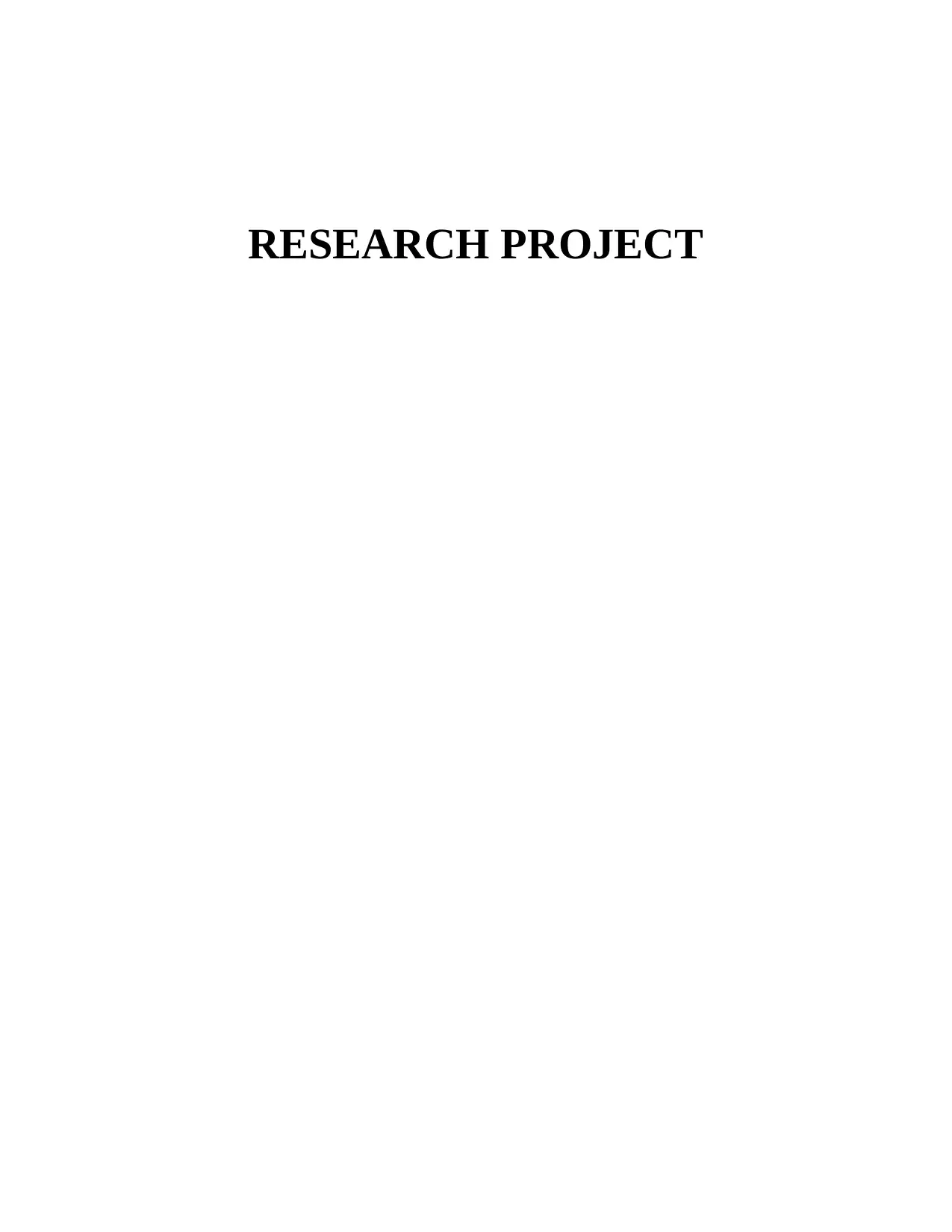
RESEARCH PROJECT
Secure Best Marks with AI Grader
Need help grading? Try our AI Grader for instant feedback on your assignments.
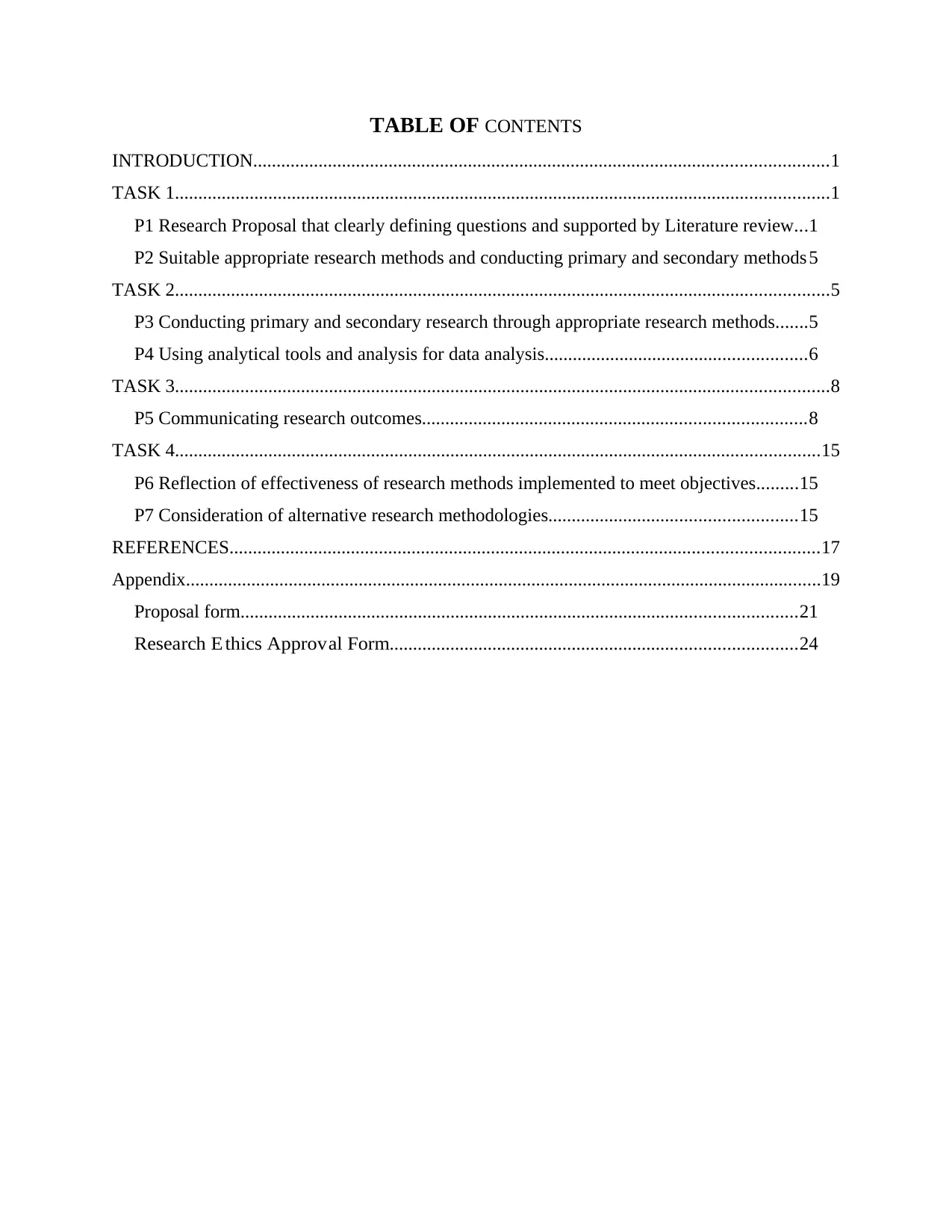
TABLE OF CONTENTS
INTRODUCTION...........................................................................................................................1
TASK 1............................................................................................................................................1
P1 Research Proposal that clearly defining questions and supported by Literature review...1
P2 Suitable appropriate research methods and conducting primary and secondary methods 5
TASK 2............................................................................................................................................5
P3 Conducting primary and secondary research through appropriate research methods.......5
P4 Using analytical tools and analysis for data analysis........................................................6
TASK 3............................................................................................................................................8
P5 Communicating research outcomes..................................................................................8
TASK 4..........................................................................................................................................15
P6 Reflection of effectiveness of research methods implemented to meet objectives.........15
P7 Consideration of alternative research methodologies.....................................................15
REFERENCES..............................................................................................................................17
Appendix........................................................................................................................................19
Proposal form.......................................................................................................................21
Research E thics Approval Form.......................................................................................24
INTRODUCTION...........................................................................................................................1
TASK 1............................................................................................................................................1
P1 Research Proposal that clearly defining questions and supported by Literature review...1
P2 Suitable appropriate research methods and conducting primary and secondary methods 5
TASK 2............................................................................................................................................5
P3 Conducting primary and secondary research through appropriate research methods.......5
P4 Using analytical tools and analysis for data analysis........................................................6
TASK 3............................................................................................................................................8
P5 Communicating research outcomes..................................................................................8
TASK 4..........................................................................................................................................15
P6 Reflection of effectiveness of research methods implemented to meet objectives.........15
P7 Consideration of alternative research methodologies.....................................................15
REFERENCES..............................................................................................................................17
Appendix........................................................................................................................................19
Proposal form.......................................................................................................................21
Research E thics Approval Form.......................................................................................24
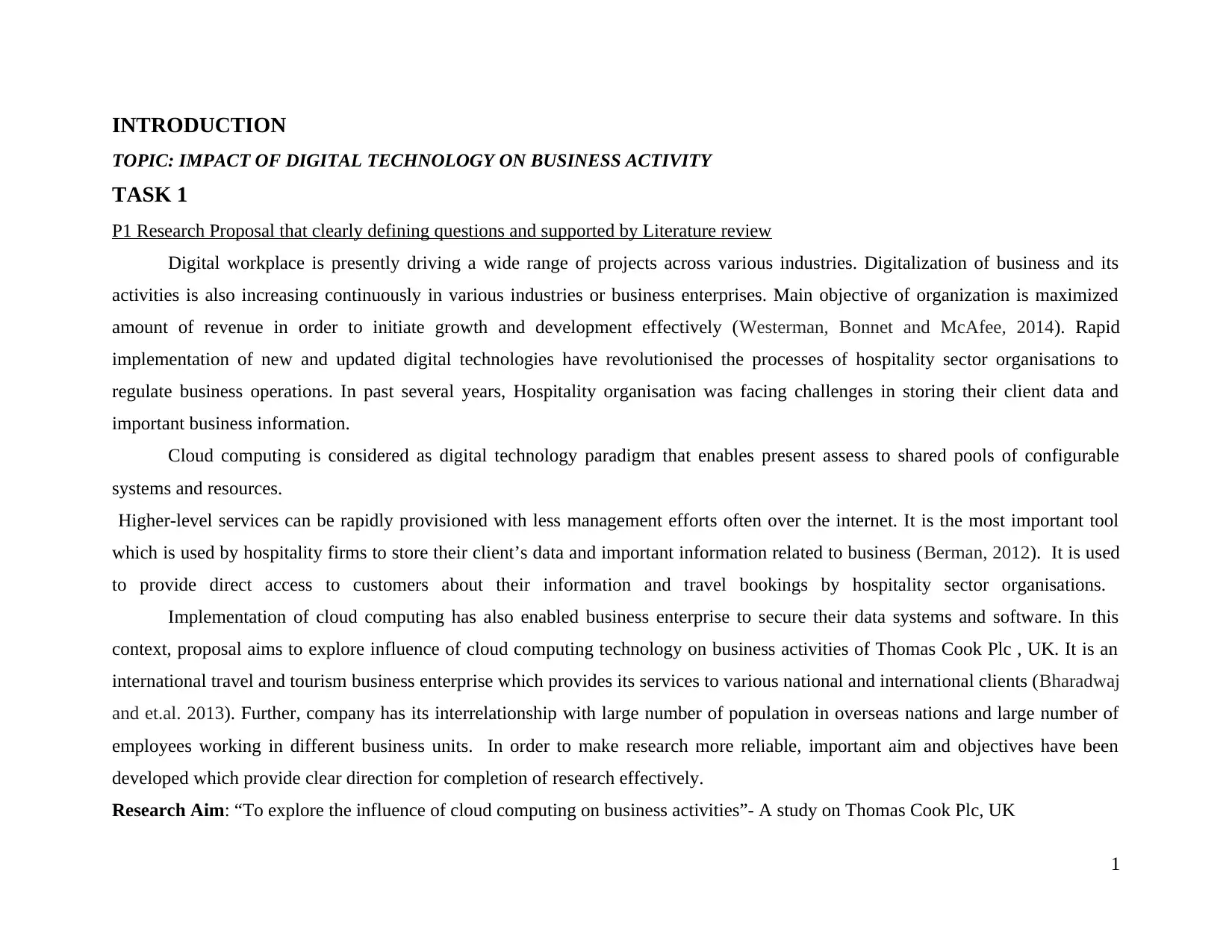
INTRODUCTION
TOPIC: IMPACT OF DIGITAL TECHNOLOGY ON BUSINESS ACTIVITY
TASK 1
P1 Research Proposal that clearly defining questions and supported by Literature review
Digital workplace is presently driving a wide range of projects across various industries. Digitalization of business and its
activities is also increasing continuously in various industries or business enterprises. Main objective of organization is maximized
amount of revenue in order to initiate growth and development effectively (Westerman, Bonnet and McAfee, 2014). Rapid
implementation of new and updated digital technologies have revolutionised the processes of hospitality sector organisations to
regulate business operations. In past several years, Hospitality organisation was facing challenges in storing their client data and
important business information.
Cloud computing is considered as digital technology paradigm that enables present assess to shared pools of configurable
systems and resources.
Higher-level services can be rapidly provisioned with less management efforts often over the internet. It is the most important tool
which is used by hospitality firms to store their client’s data and important information related to business (Berman, 2012). It is used
to provide direct access to customers about their information and travel bookings by hospitality sector organisations.
Implementation of cloud computing has also enabled business enterprise to secure their data systems and software. In this
context, proposal aims to explore influence of cloud computing technology on business activities of Thomas Cook Plc , UK. It is an
international travel and tourism business enterprise which provides its services to various national and international clients (Bharadwaj
and et.al. 2013). Further, company has its interrelationship with large number of population in overseas nations and large number of
employees working in different business units. In order to make research more reliable, important aim and objectives have been
developed which provide clear direction for completion of research effectively.
Research Aim: “To explore the influence of cloud computing on business activities”- A study on Thomas Cook Plc, UK
1
TOPIC: IMPACT OF DIGITAL TECHNOLOGY ON BUSINESS ACTIVITY
TASK 1
P1 Research Proposal that clearly defining questions and supported by Literature review
Digital workplace is presently driving a wide range of projects across various industries. Digitalization of business and its
activities is also increasing continuously in various industries or business enterprises. Main objective of organization is maximized
amount of revenue in order to initiate growth and development effectively (Westerman, Bonnet and McAfee, 2014). Rapid
implementation of new and updated digital technologies have revolutionised the processes of hospitality sector organisations to
regulate business operations. In past several years, Hospitality organisation was facing challenges in storing their client data and
important business information.
Cloud computing is considered as digital technology paradigm that enables present assess to shared pools of configurable
systems and resources.
Higher-level services can be rapidly provisioned with less management efforts often over the internet. It is the most important tool
which is used by hospitality firms to store their client’s data and important information related to business (Berman, 2012). It is used
to provide direct access to customers about their information and travel bookings by hospitality sector organisations.
Implementation of cloud computing has also enabled business enterprise to secure their data systems and software. In this
context, proposal aims to explore influence of cloud computing technology on business activities of Thomas Cook Plc , UK. It is an
international travel and tourism business enterprise which provides its services to various national and international clients (Bharadwaj
and et.al. 2013). Further, company has its interrelationship with large number of population in overseas nations and large number of
employees working in different business units. In order to make research more reliable, important aim and objectives have been
developed which provide clear direction for completion of research effectively.
Research Aim: “To explore the influence of cloud computing on business activities”- A study on Thomas Cook Plc, UK
1
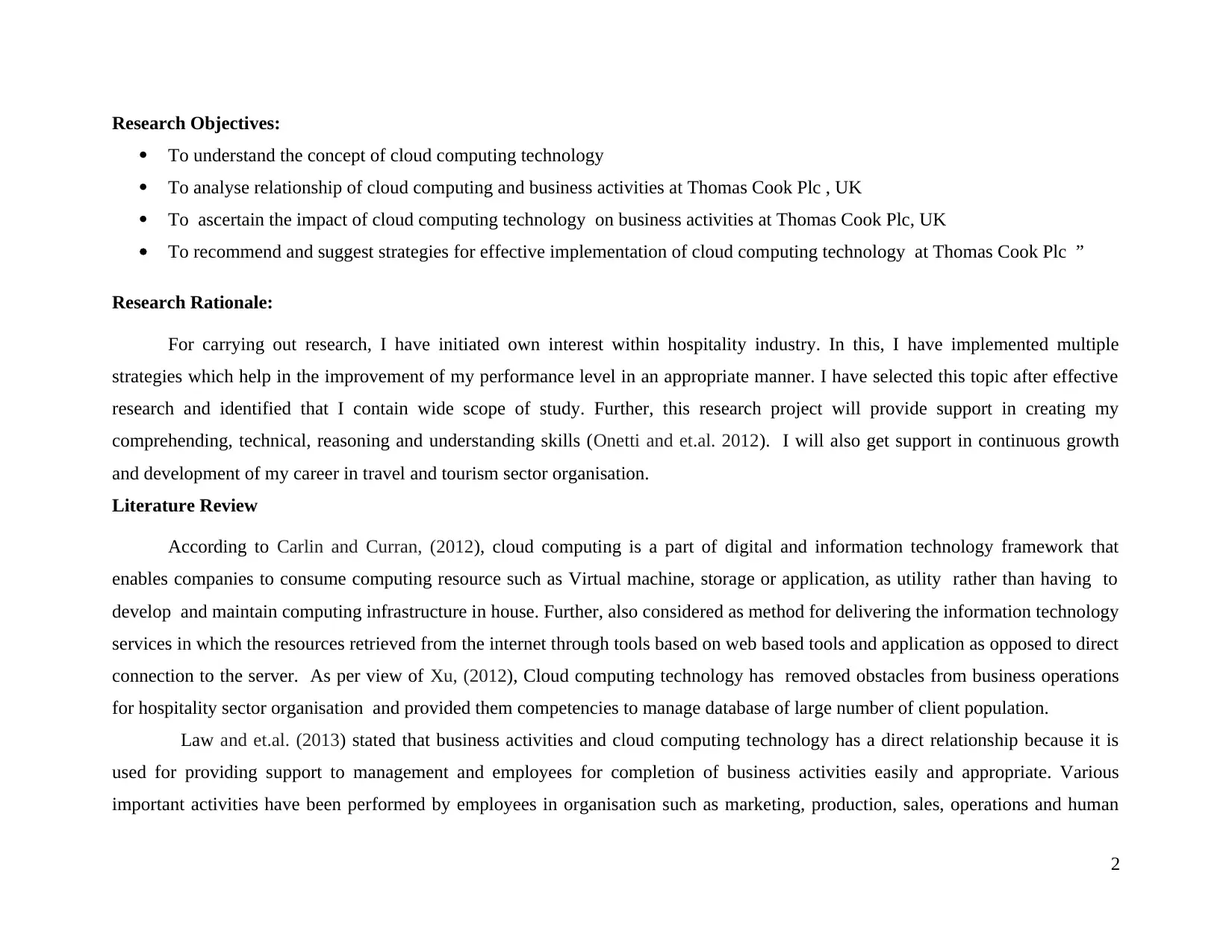
Research Objectives:
To understand the concept of cloud computing technology
To analyse relationship of cloud computing and business activities at Thomas Cook Plc , UK
To ascertain the impact of cloud computing technology on business activities at Thomas Cook Plc, UK
To recommend and suggest strategies for effective implementation of cloud computing technology at Thomas Cook Plc ”
Research Rationale:
For carrying out research, I have initiated own interest within hospitality industry. In this, I have implemented multiple
strategies which help in the improvement of my performance level in an appropriate manner. I have selected this topic after effective
research and identified that I contain wide scope of study. Further, this research project will provide support in creating my
comprehending, technical, reasoning and understanding skills (Onetti and et.al. 2012). I will also get support in continuous growth
and development of my career in travel and tourism sector organisation.
Literature Review
According to Carlin and Curran, (2012), cloud computing is a part of digital and information technology framework that
enables companies to consume computing resource such as Virtual machine, storage or application, as utility rather than having to
develop and maintain computing infrastructure in house. Further, also considered as method for delivering the information technology
services in which the resources retrieved from the internet through tools based on web based tools and application as opposed to direct
connection to the server. As per view of Xu, (2012), Cloud computing technology has removed obstacles from business operations
for hospitality sector organisation and provided them competencies to manage database of large number of client population.
Law and et.al. (2013) stated that business activities and cloud computing technology has a direct relationship because it is
used for providing support to management and employees for completion of business activities easily and appropriate. Various
important activities have been performed by employees in organisation such as marketing, production, sales, operations and human
2
To understand the concept of cloud computing technology
To analyse relationship of cloud computing and business activities at Thomas Cook Plc , UK
To ascertain the impact of cloud computing technology on business activities at Thomas Cook Plc, UK
To recommend and suggest strategies for effective implementation of cloud computing technology at Thomas Cook Plc ”
Research Rationale:
For carrying out research, I have initiated own interest within hospitality industry. In this, I have implemented multiple
strategies which help in the improvement of my performance level in an appropriate manner. I have selected this topic after effective
research and identified that I contain wide scope of study. Further, this research project will provide support in creating my
comprehending, technical, reasoning and understanding skills (Onetti and et.al. 2012). I will also get support in continuous growth
and development of my career in travel and tourism sector organisation.
Literature Review
According to Carlin and Curran, (2012), cloud computing is a part of digital and information technology framework that
enables companies to consume computing resource such as Virtual machine, storage or application, as utility rather than having to
develop and maintain computing infrastructure in house. Further, also considered as method for delivering the information technology
services in which the resources retrieved from the internet through tools based on web based tools and application as opposed to direct
connection to the server. As per view of Xu, (2012), Cloud computing technology has removed obstacles from business operations
for hospitality sector organisation and provided them competencies to manage database of large number of client population.
Law and et.al. (2013) stated that business activities and cloud computing technology has a direct relationship because it is
used for providing support to management and employees for completion of business activities easily and appropriate. Various
important activities have been performed by employees in organisation such as marketing, production, sales, operations and human
2
Secure Best Marks with AI Grader
Need help grading? Try our AI Grader for instant feedback on your assignments.
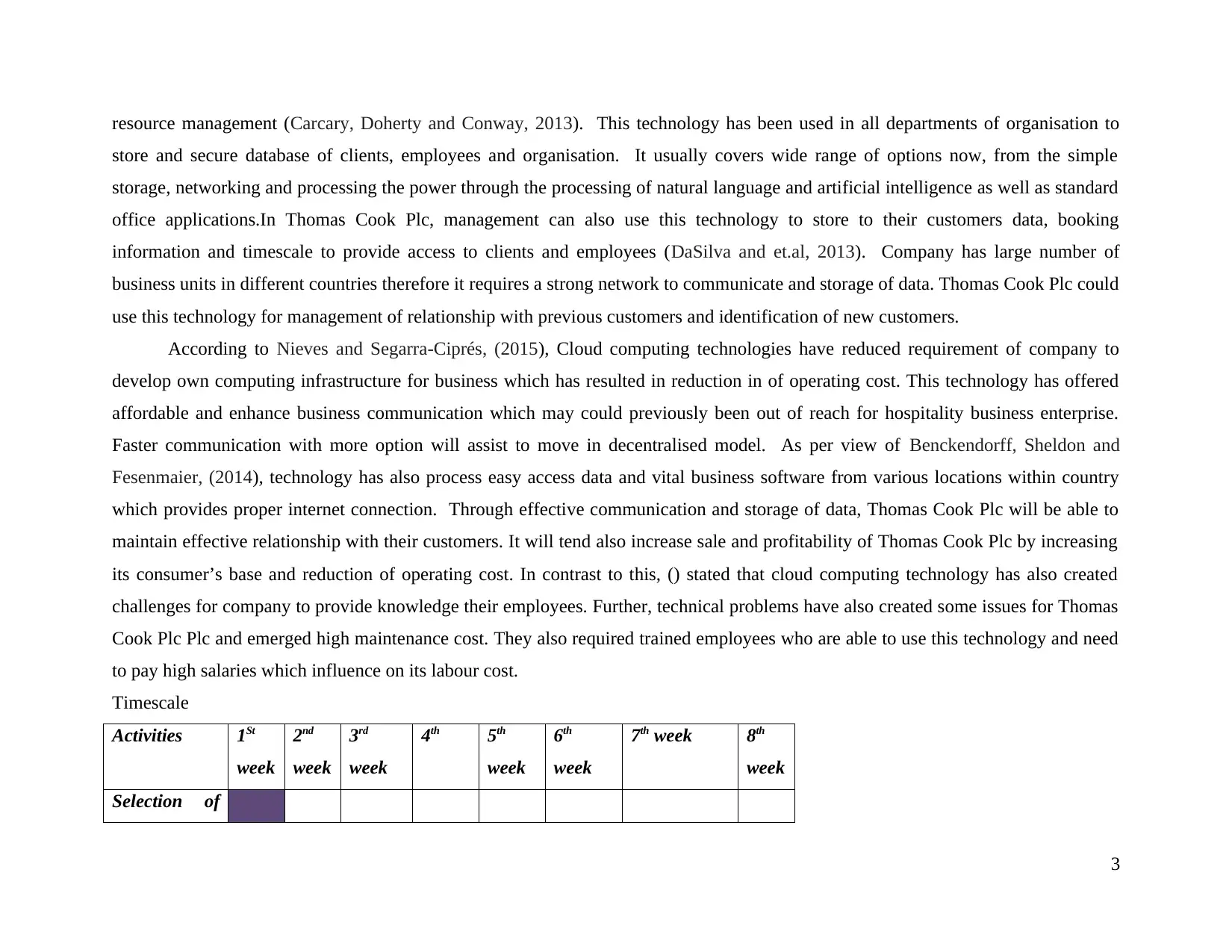
resource management (Carcary, Doherty and Conway, 2013). This technology has been used in all departments of organisation to
store and secure database of clients, employees and organisation. It usually covers wide range of options now, from the simple
storage, networking and processing the power through the processing of natural language and artificial intelligence as well as standard
office applications.In Thomas Cook Plc, management can also use this technology to store to their customers data, booking
information and timescale to provide access to clients and employees (DaSilva and et.al, 2013). Company has large number of
business units in different countries therefore it requires a strong network to communicate and storage of data. Thomas Cook Plc could
use this technology for management of relationship with previous customers and identification of new customers.
According to Nieves and Segarra-Ciprés, (2015), Cloud computing technologies have reduced requirement of company to
develop own computing infrastructure for business which has resulted in reduction in of operating cost. This technology has offered
affordable and enhance business communication which may could previously been out of reach for hospitality business enterprise.
Faster communication with more option will assist to move in decentralised model. As per view of Benckendorff, Sheldon and
Fesenmaier, (2014), technology has also process easy access data and vital business software from various locations within country
which provides proper internet connection. Through effective communication and storage of data, Thomas Cook Plc will be able to
maintain effective relationship with their customers. It will tend also increase sale and profitability of Thomas Cook Plc by increasing
its consumer’s base and reduction of operating cost. In contrast to this, () stated that cloud computing technology has also created
challenges for company to provide knowledge their employees. Further, technical problems have also created some issues for Thomas
Cook Plc Plc and emerged high maintenance cost. They also required trained employees who are able to use this technology and need
to pay high salaries which influence on its labour cost.
Timescale
Activities 1St
week
2nd
week
3rd
week
4th 5th
week
6th
week
7th week 8th
week
Selection of
3
store and secure database of clients, employees and organisation. It usually covers wide range of options now, from the simple
storage, networking and processing the power through the processing of natural language and artificial intelligence as well as standard
office applications.In Thomas Cook Plc, management can also use this technology to store to their customers data, booking
information and timescale to provide access to clients and employees (DaSilva and et.al, 2013). Company has large number of
business units in different countries therefore it requires a strong network to communicate and storage of data. Thomas Cook Plc could
use this technology for management of relationship with previous customers and identification of new customers.
According to Nieves and Segarra-Ciprés, (2015), Cloud computing technologies have reduced requirement of company to
develop own computing infrastructure for business which has resulted in reduction in of operating cost. This technology has offered
affordable and enhance business communication which may could previously been out of reach for hospitality business enterprise.
Faster communication with more option will assist to move in decentralised model. As per view of Benckendorff, Sheldon and
Fesenmaier, (2014), technology has also process easy access data and vital business software from various locations within country
which provides proper internet connection. Through effective communication and storage of data, Thomas Cook Plc will be able to
maintain effective relationship with their customers. It will tend also increase sale and profitability of Thomas Cook Plc by increasing
its consumer’s base and reduction of operating cost. In contrast to this, () stated that cloud computing technology has also created
challenges for company to provide knowledge their employees. Further, technical problems have also created some issues for Thomas
Cook Plc Plc and emerged high maintenance cost. They also required trained employees who are able to use this technology and need
to pay high salaries which influence on its labour cost.
Timescale
Activities 1St
week
2nd
week
3rd
week
4th 5th
week
6th
week
7th week 8th
week
Selection of
3
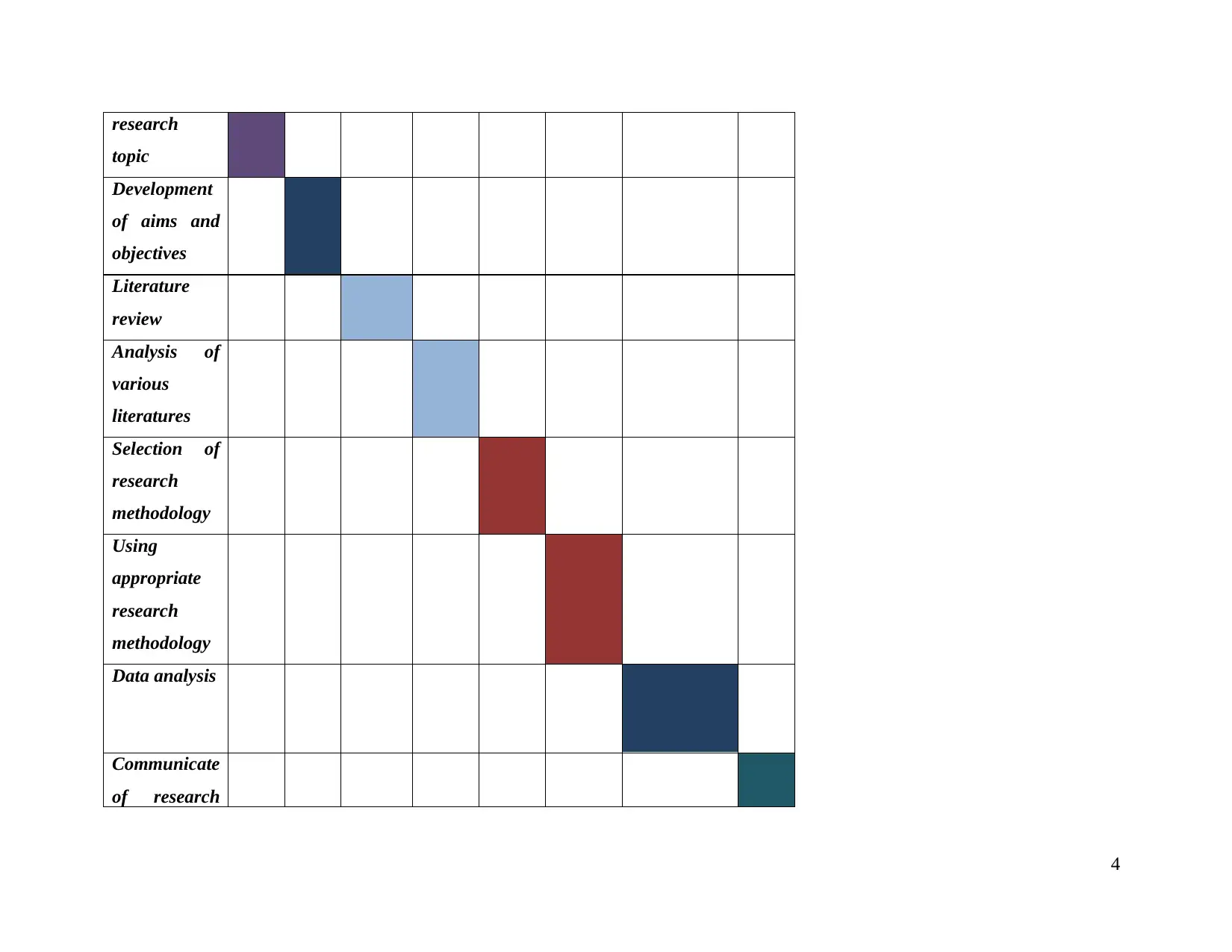
research
topic
Development
of aims and
objectives
Literature
review
Analysis of
various
literatures
Selection of
research
methodology
Using
appropriate
research
methodology
Data analysis
Communicate
of research
4
topic
Development
of aims and
objectives
Literature
review
Analysis of
various
literatures
Selection of
research
methodology
Using
appropriate
research
methodology
Data analysis
Communicate
of research
4
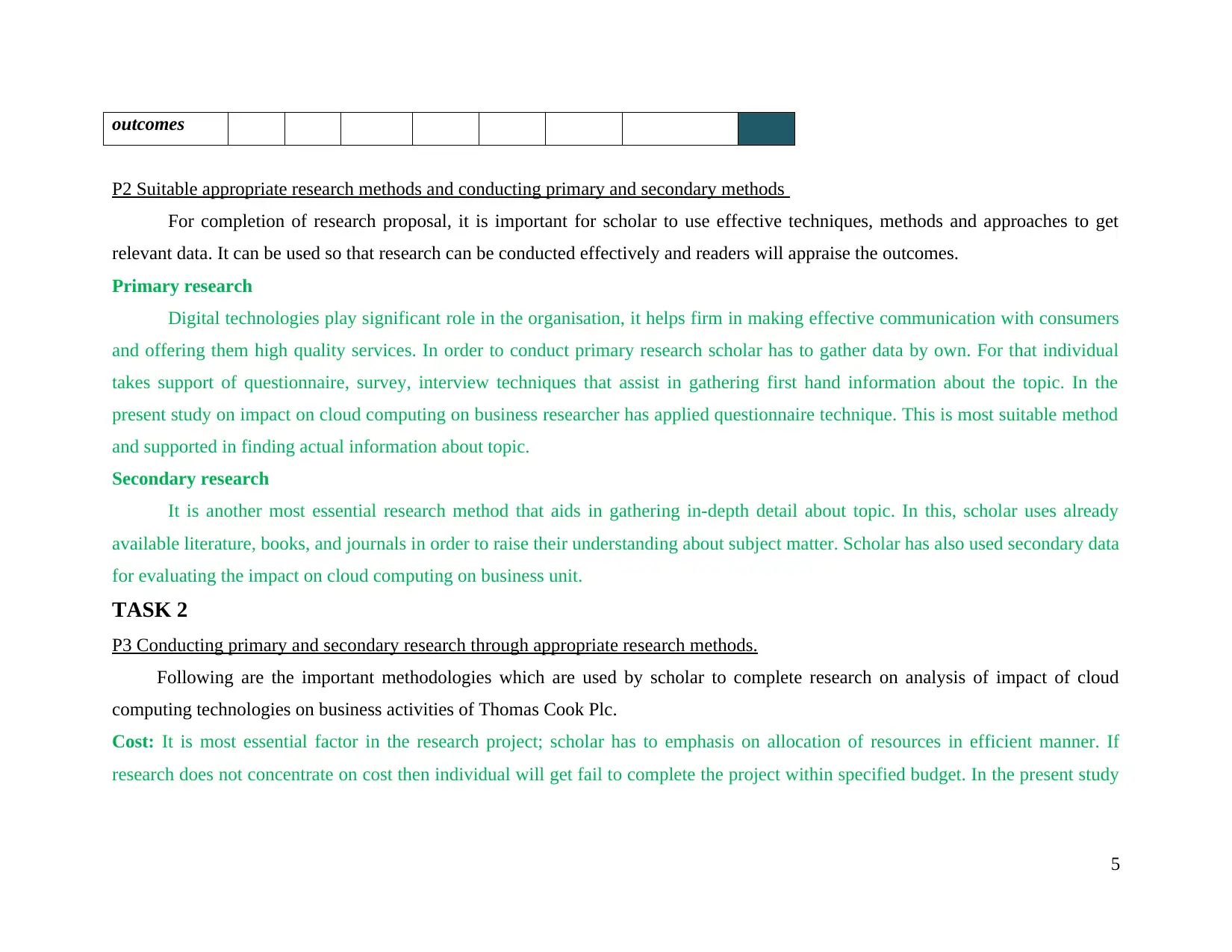
outcomes
P2 Suitable appropriate research methods and conducting primary and secondary methods
For completion of research proposal, it is important for scholar to use effective techniques, methods and approaches to get
relevant data. It can be used so that research can be conducted effectively and readers will appraise the outcomes.
Primary research
Digital technologies play significant role in the organisation, it helps firm in making effective communication with consumers
and offering them high quality services. In order to conduct primary research scholar has to gather data by own. For that individual
takes support of questionnaire, survey, interview techniques that assist in gathering first hand information about the topic. In the
present study on impact on cloud computing on business researcher has applied questionnaire technique. This is most suitable method
and supported in finding actual information about topic.
Secondary research
It is another most essential research method that aids in gathering in-depth detail about topic. In this, scholar uses already
available literature, books, and journals in order to raise their understanding about subject matter. Scholar has also used secondary data
for evaluating the impact on cloud computing on business unit.
TASK 2
P3 Conducting primary and secondary research through appropriate research methods.
Following are the important methodologies which are used by scholar to complete research on analysis of impact of cloud
computing technologies on business activities of Thomas Cook Plc.
Cost: It is most essential factor in the research project; scholar has to emphasis on allocation of resources in efficient manner. If
research does not concentrate on cost then individual will get fail to complete the project within specified budget. In the present study
5
P2 Suitable appropriate research methods and conducting primary and secondary methods
For completion of research proposal, it is important for scholar to use effective techniques, methods and approaches to get
relevant data. It can be used so that research can be conducted effectively and readers will appraise the outcomes.
Primary research
Digital technologies play significant role in the organisation, it helps firm in making effective communication with consumers
and offering them high quality services. In order to conduct primary research scholar has to gather data by own. For that individual
takes support of questionnaire, survey, interview techniques that assist in gathering first hand information about the topic. In the
present study on impact on cloud computing on business researcher has applied questionnaire technique. This is most suitable method
and supported in finding actual information about topic.
Secondary research
It is another most essential research method that aids in gathering in-depth detail about topic. In this, scholar uses already
available literature, books, and journals in order to raise their understanding about subject matter. Scholar has also used secondary data
for evaluating the impact on cloud computing on business unit.
TASK 2
P3 Conducting primary and secondary research through appropriate research methods.
Following are the important methodologies which are used by scholar to complete research on analysis of impact of cloud
computing technologies on business activities of Thomas Cook Plc.
Cost: It is most essential factor in the research project; scholar has to emphasis on allocation of resources in efficient manner. If
research does not concentrate on cost then individual will get fail to complete the project within specified budget. In the present study
5
Paraphrase This Document
Need a fresh take? Get an instant paraphrase of this document with our AI Paraphraser
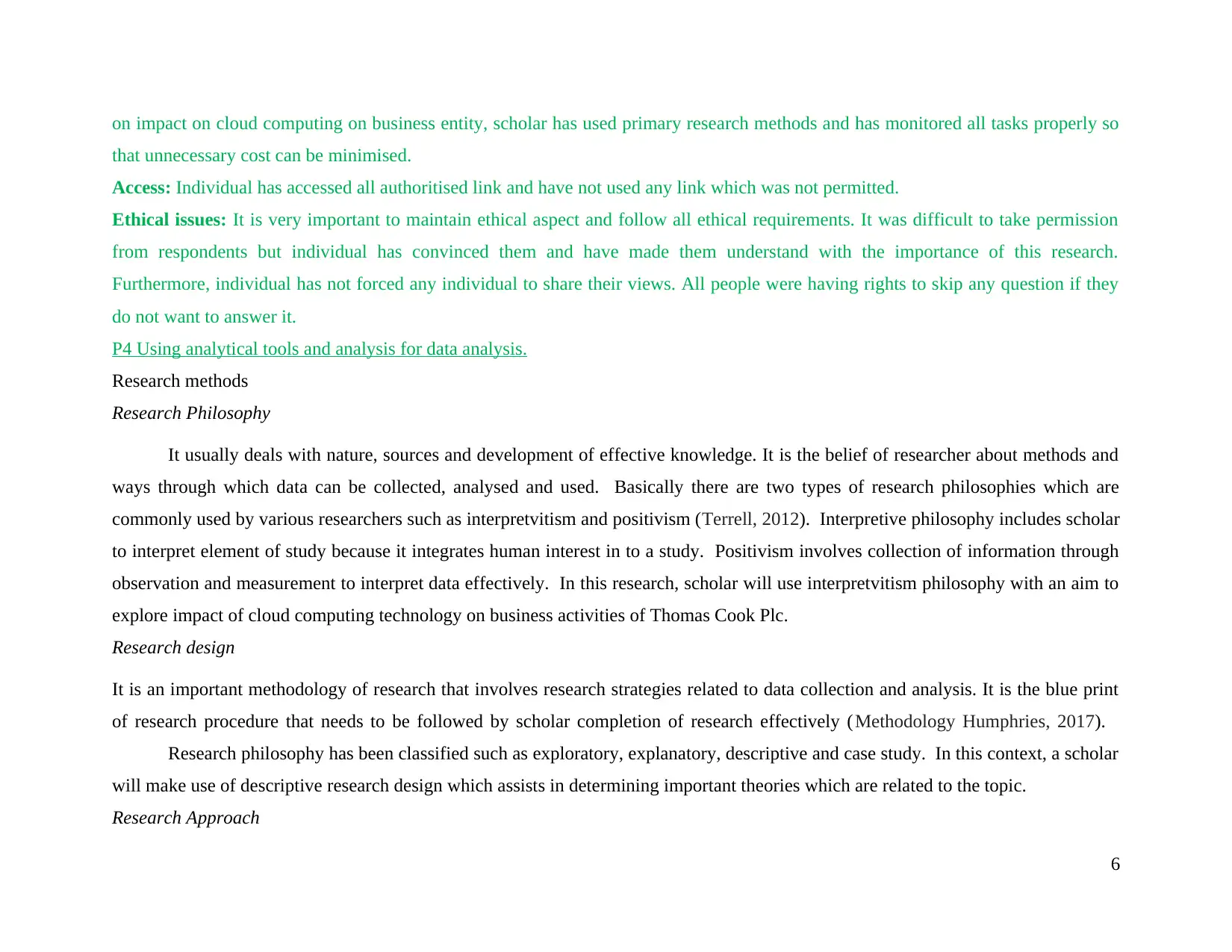
on impact on cloud computing on business entity, scholar has used primary research methods and has monitored all tasks properly so
that unnecessary cost can be minimised.
Access: Individual has accessed all authoritised link and have not used any link which was not permitted.
Ethical issues: It is very important to maintain ethical aspect and follow all ethical requirements. It was difficult to take permission
from respondents but individual has convinced them and have made them understand with the importance of this research.
Furthermore, individual has not forced any individual to share their views. All people were having rights to skip any question if they
do not want to answer it.
P4 Using analytical tools and analysis for data analysis.
Research methods
Research Philosophy
It usually deals with nature, sources and development of effective knowledge. It is the belief of researcher about methods and
ways through which data can be collected, analysed and used. Basically there are two types of research philosophies which are
commonly used by various researchers such as interpretvitism and positivism (Terrell, 2012). Interpretive philosophy includes scholar
to interpret element of study because it integrates human interest in to a study. Positivism involves collection of information through
observation and measurement to interpret data effectively. In this research, scholar will use interpretvitism philosophy with an aim to
explore impact of cloud computing technology on business activities of Thomas Cook Plc.
Research design
It is an important methodology of research that involves research strategies related to data collection and analysis. It is the blue print
of research procedure that needs to be followed by scholar completion of research effectively (Methodology Humphries, 2017).
Research philosophy has been classified such as exploratory, explanatory, descriptive and case study. In this context, a scholar
will make use of descriptive research design which assists in determining important theories which are related to the topic.
Research Approach
6
that unnecessary cost can be minimised.
Access: Individual has accessed all authoritised link and have not used any link which was not permitted.
Ethical issues: It is very important to maintain ethical aspect and follow all ethical requirements. It was difficult to take permission
from respondents but individual has convinced them and have made them understand with the importance of this research.
Furthermore, individual has not forced any individual to share their views. All people were having rights to skip any question if they
do not want to answer it.
P4 Using analytical tools and analysis for data analysis.
Research methods
Research Philosophy
It usually deals with nature, sources and development of effective knowledge. It is the belief of researcher about methods and
ways through which data can be collected, analysed and used. Basically there are two types of research philosophies which are
commonly used by various researchers such as interpretvitism and positivism (Terrell, 2012). Interpretive philosophy includes scholar
to interpret element of study because it integrates human interest in to a study. Positivism involves collection of information through
observation and measurement to interpret data effectively. In this research, scholar will use interpretvitism philosophy with an aim to
explore impact of cloud computing technology on business activities of Thomas Cook Plc.
Research design
It is an important methodology of research that involves research strategies related to data collection and analysis. It is the blue print
of research procedure that needs to be followed by scholar completion of research effectively (Methodology Humphries, 2017).
Research philosophy has been classified such as exploratory, explanatory, descriptive and case study. In this context, a scholar
will make use of descriptive research design which assists in determining important theories which are related to the topic.
Research Approach
6
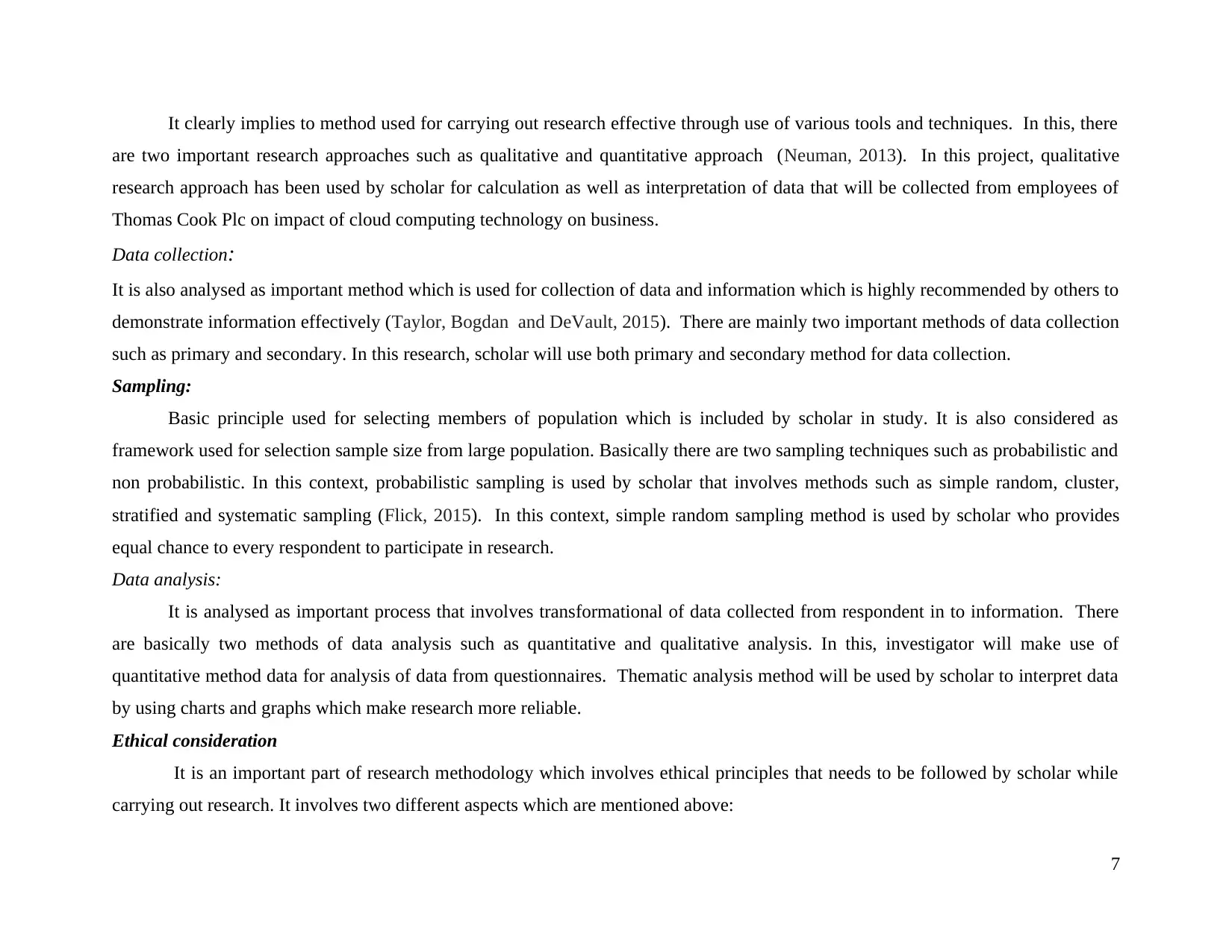
It clearly implies to method used for carrying out research effective through use of various tools and techniques. In this, there
are two important research approaches such as qualitative and quantitative approach (Neuman, 2013). In this project, qualitative
research approach has been used by scholar for calculation as well as interpretation of data that will be collected from employees of
Thomas Cook Plc on impact of cloud computing technology on business.
Data collection:
It is also analysed as important method which is used for collection of data and information which is highly recommended by others to
demonstrate information effectively (Taylor, Bogdan and DeVault, 2015). There are mainly two important methods of data collection
such as primary and secondary. In this research, scholar will use both primary and secondary method for data collection.
Sampling:
Basic principle used for selecting members of population which is included by scholar in study. It is also considered as
framework used for selection sample size from large population. Basically there are two sampling techniques such as probabilistic and
non probabilistic. In this context, probabilistic sampling is used by scholar that involves methods such as simple random, cluster,
stratified and systematic sampling (Flick, 2015). In this context, simple random sampling method is used by scholar who provides
equal chance to every respondent to participate in research.
Data analysis:
It is analysed as important process that involves transformational of data collected from respondent in to information. There
are basically two methods of data analysis such as quantitative and qualitative analysis. In this, investigator will make use of
quantitative method data for analysis of data from questionnaires. Thematic analysis method will be used by scholar to interpret data
by using charts and graphs which make research more reliable.
Ethical consideration
It is an important part of research methodology which involves ethical principles that needs to be followed by scholar while
carrying out research. It involves two different aspects which are mentioned above:
7
are two important research approaches such as qualitative and quantitative approach (Neuman, 2013). In this project, qualitative
research approach has been used by scholar for calculation as well as interpretation of data that will be collected from employees of
Thomas Cook Plc on impact of cloud computing technology on business.
Data collection:
It is also analysed as important method which is used for collection of data and information which is highly recommended by others to
demonstrate information effectively (Taylor, Bogdan and DeVault, 2015). There are mainly two important methods of data collection
such as primary and secondary. In this research, scholar will use both primary and secondary method for data collection.
Sampling:
Basic principle used for selecting members of population which is included by scholar in study. It is also considered as
framework used for selection sample size from large population. Basically there are two sampling techniques such as probabilistic and
non probabilistic. In this context, probabilistic sampling is used by scholar that involves methods such as simple random, cluster,
stratified and systematic sampling (Flick, 2015). In this context, simple random sampling method is used by scholar who provides
equal chance to every respondent to participate in research.
Data analysis:
It is analysed as important process that involves transformational of data collected from respondent in to information. There
are basically two methods of data analysis such as quantitative and qualitative analysis. In this, investigator will make use of
quantitative method data for analysis of data from questionnaires. Thematic analysis method will be used by scholar to interpret data
by using charts and graphs which make research more reliable.
Ethical consideration
It is an important part of research methodology which involves ethical principles that needs to be followed by scholar while
carrying out research. It involves two different aspects which are mentioned above:
7
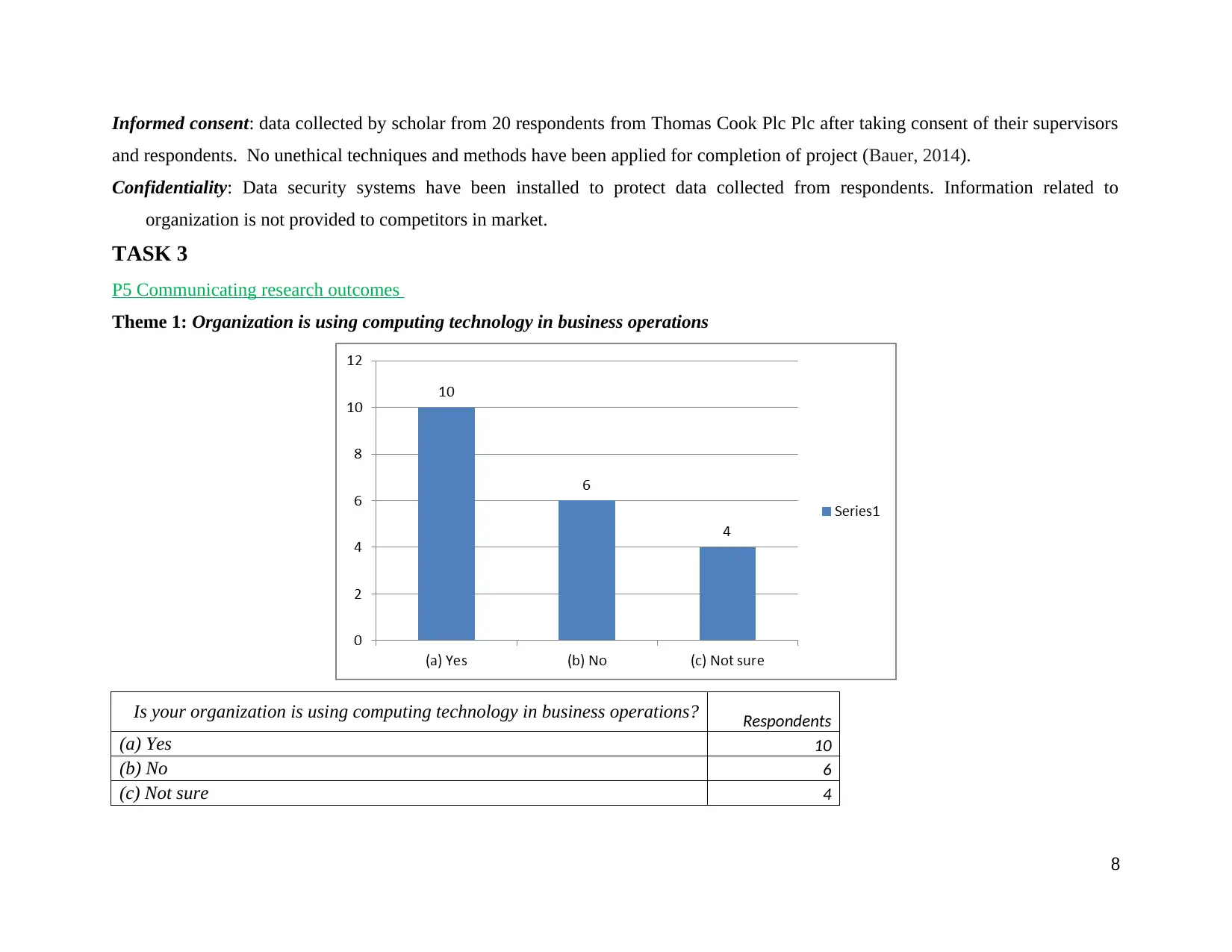
Informed consent: data collected by scholar from 20 respondents from Thomas Cook Plc Plc after taking consent of their supervisors
and respondents. No unethical techniques and methods have been applied for completion of project (Bauer, 2014).
Confidentiality: Data security systems have been installed to protect data collected from respondents. Information related to
organization is not provided to competitors in market.
TASK 3
P5 Communicating research outcomes
Theme 1: Organization is using computing technology in business operations
Is your organization is using computing technology in business operations? Respondents
(a) Yes 10
(b) No 6
(c) Not sure 4
8
and respondents. No unethical techniques and methods have been applied for completion of project (Bauer, 2014).
Confidentiality: Data security systems have been installed to protect data collected from respondents. Information related to
organization is not provided to competitors in market.
TASK 3
P5 Communicating research outcomes
Theme 1: Organization is using computing technology in business operations
Is your organization is using computing technology in business operations? Respondents
(a) Yes 10
(b) No 6
(c) Not sure 4
8
Secure Best Marks with AI Grader
Need help grading? Try our AI Grader for instant feedback on your assignments.
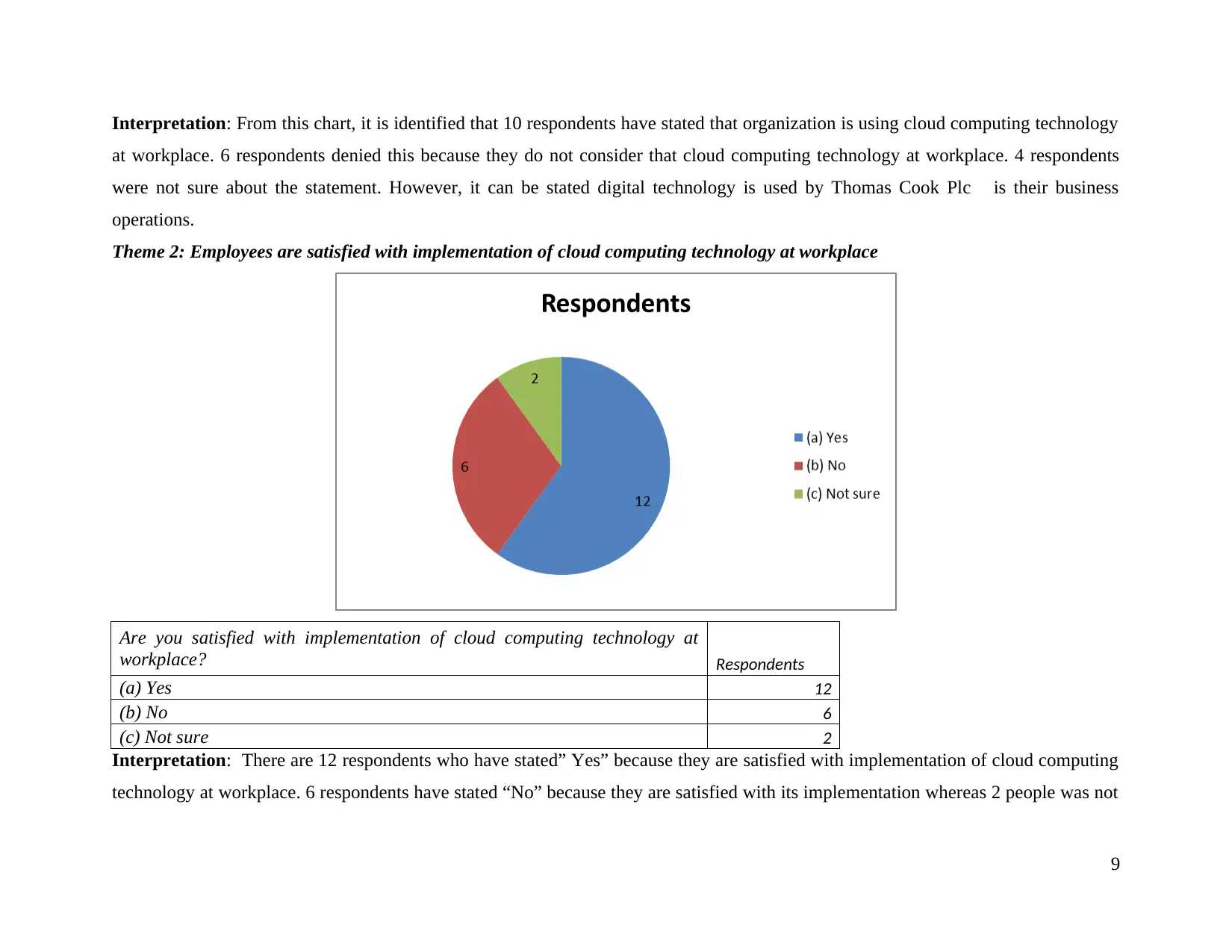
Interpretation: From this chart, it is identified that 10 respondents have stated that organization is using cloud computing technology
at workplace. 6 respondents denied this because they do not consider that cloud computing technology at workplace. 4 respondents
were not sure about the statement. However, it can be stated digital technology is used by Thomas Cook Plc is their business
operations.
Theme 2: Employees are satisfied with implementation of cloud computing technology at workplace
Are you satisfied with implementation of cloud computing technology at
workplace? Respondents
(a) Yes 12
(b) No 6
(c) Not sure 2
Interpretation: There are 12 respondents who have stated” Yes” because they are satisfied with implementation of cloud computing
technology at workplace. 6 respondents have stated “No” because they are satisfied with its implementation whereas 2 people was not
9
at workplace. 6 respondents denied this because they do not consider that cloud computing technology at workplace. 4 respondents
were not sure about the statement. However, it can be stated digital technology is used by Thomas Cook Plc is their business
operations.
Theme 2: Employees are satisfied with implementation of cloud computing technology at workplace
Are you satisfied with implementation of cloud computing technology at
workplace? Respondents
(a) Yes 12
(b) No 6
(c) Not sure 2
Interpretation: There are 12 respondents who have stated” Yes” because they are satisfied with implementation of cloud computing
technology at workplace. 6 respondents have stated “No” because they are satisfied with its implementation whereas 2 people was not
9
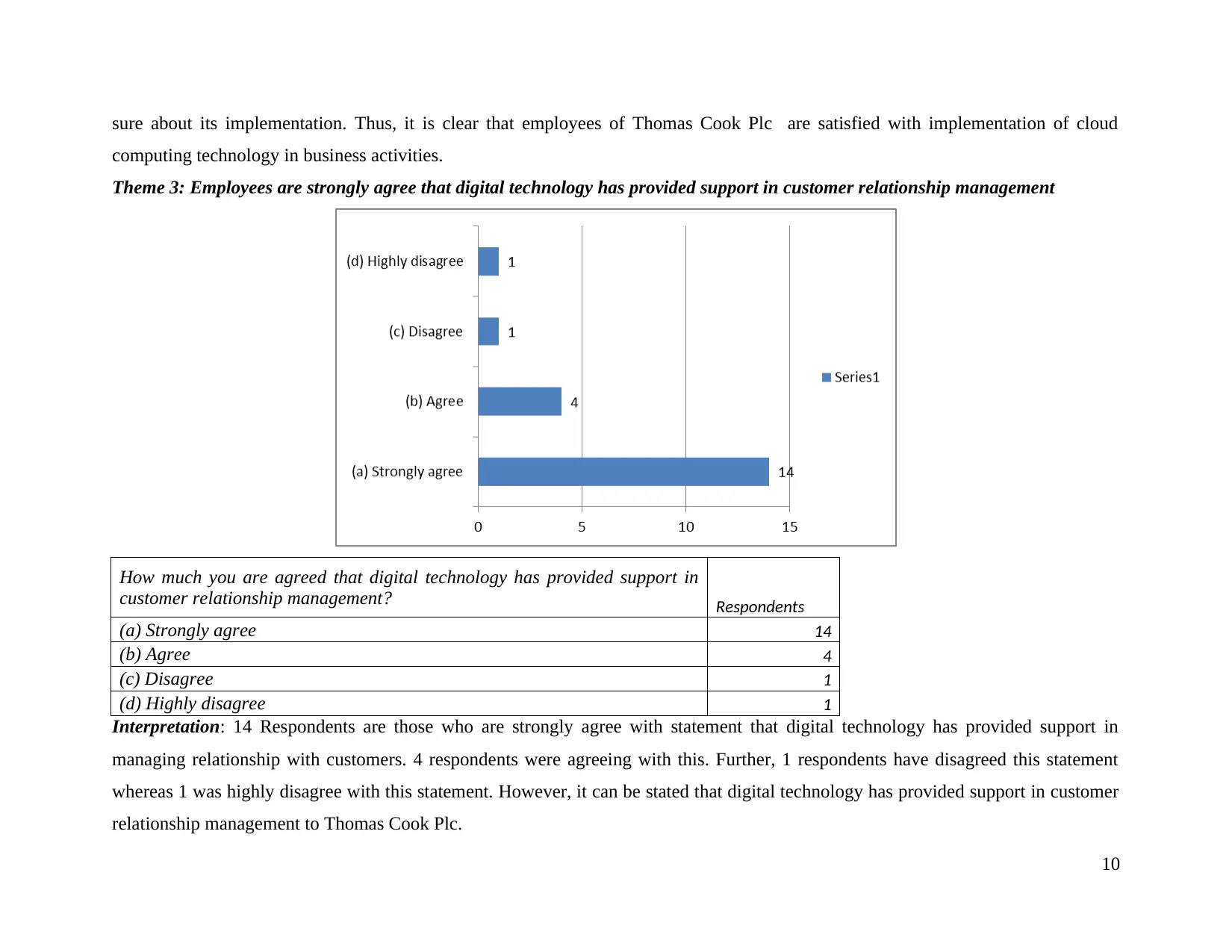
sure about its implementation. Thus, it is clear that employees of Thomas Cook Plc are satisfied with implementation of cloud
computing technology in business activities.
Theme 3: Employees are strongly agree that digital technology has provided support in customer relationship management
How much you are agreed that digital technology has provided support in
customer relationship management? Respondents
(a) Strongly agree 14
(b) Agree 4
(c) Disagree 1
(d) Highly disagree 1
Interpretation: 14 Respondents are those who are strongly agree with statement that digital technology has provided support in
managing relationship with customers. 4 respondents were agreeing with this. Further, 1 respondents have disagreed this statement
whereas 1 was highly disagree with this statement. However, it can be stated that digital technology has provided support in customer
relationship management to Thomas Cook Plc.
10
computing technology in business activities.
Theme 3: Employees are strongly agree that digital technology has provided support in customer relationship management
How much you are agreed that digital technology has provided support in
customer relationship management? Respondents
(a) Strongly agree 14
(b) Agree 4
(c) Disagree 1
(d) Highly disagree 1
Interpretation: 14 Respondents are those who are strongly agree with statement that digital technology has provided support in
managing relationship with customers. 4 respondents were agreeing with this. Further, 1 respondents have disagreed this statement
whereas 1 was highly disagree with this statement. However, it can be stated that digital technology has provided support in customer
relationship management to Thomas Cook Plc.
10
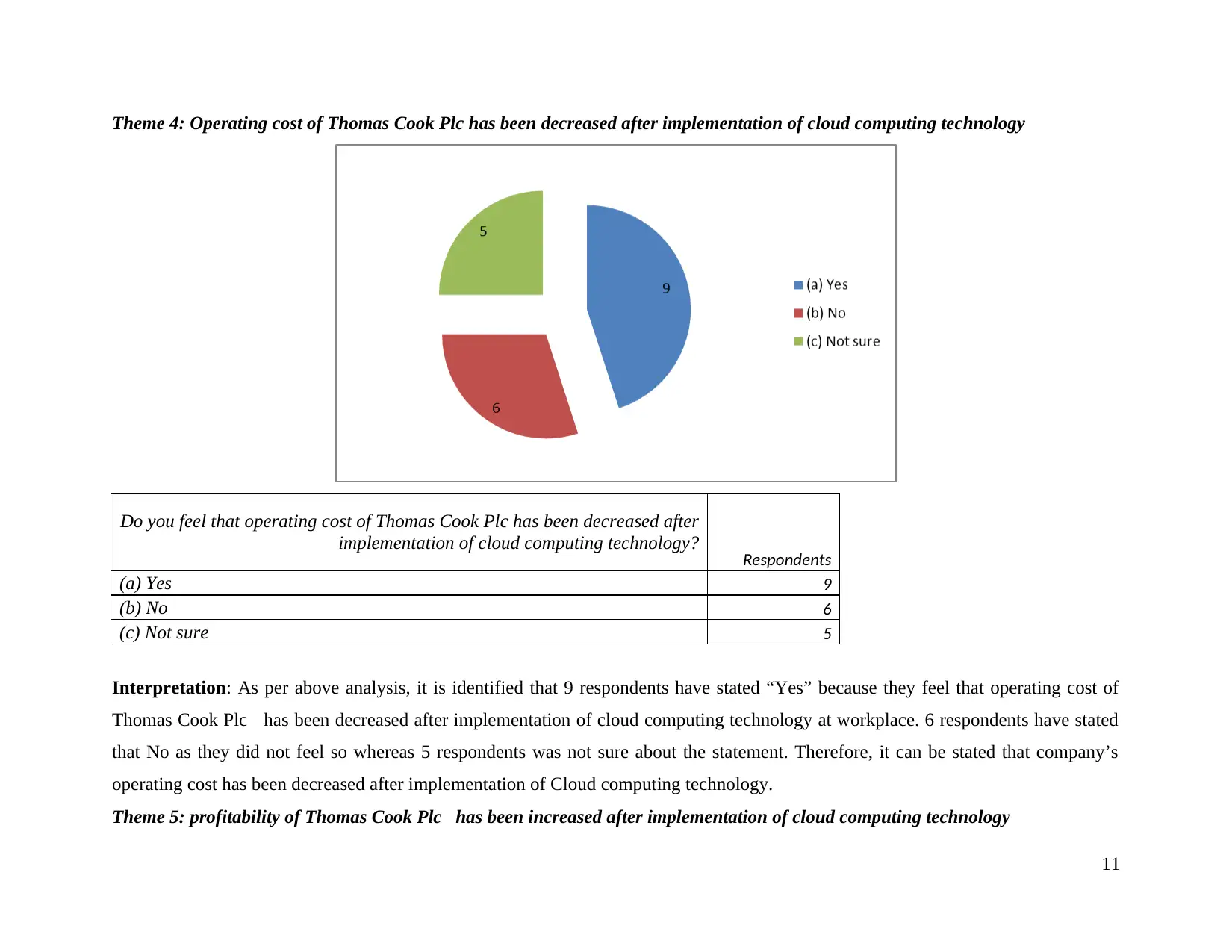
Theme 4: Operating cost of Thomas Cook Plc has been decreased after implementation of cloud computing technology
Do you feel that operating cost of Thomas Cook Plc has been decreased after
implementation of cloud computing technology? Respondents
(a) Yes 9
(b) No 6
(c) Not sure 5
Interpretation: As per above analysis, it is identified that 9 respondents have stated “Yes” because they feel that operating cost of
Thomas Cook Plc has been decreased after implementation of cloud computing technology at workplace. 6 respondents have stated
that No as they did not feel so whereas 5 respondents was not sure about the statement. Therefore, it can be stated that company’s
operating cost has been decreased after implementation of Cloud computing technology.
Theme 5: profitability of Thomas Cook Plc has been increased after implementation of cloud computing technology
11
Do you feel that operating cost of Thomas Cook Plc has been decreased after
implementation of cloud computing technology? Respondents
(a) Yes 9
(b) No 6
(c) Not sure 5
Interpretation: As per above analysis, it is identified that 9 respondents have stated “Yes” because they feel that operating cost of
Thomas Cook Plc has been decreased after implementation of cloud computing technology at workplace. 6 respondents have stated
that No as they did not feel so whereas 5 respondents was not sure about the statement. Therefore, it can be stated that company’s
operating cost has been decreased after implementation of Cloud computing technology.
Theme 5: profitability of Thomas Cook Plc has been increased after implementation of cloud computing technology
11
Paraphrase This Document
Need a fresh take? Get an instant paraphrase of this document with our AI Paraphraser
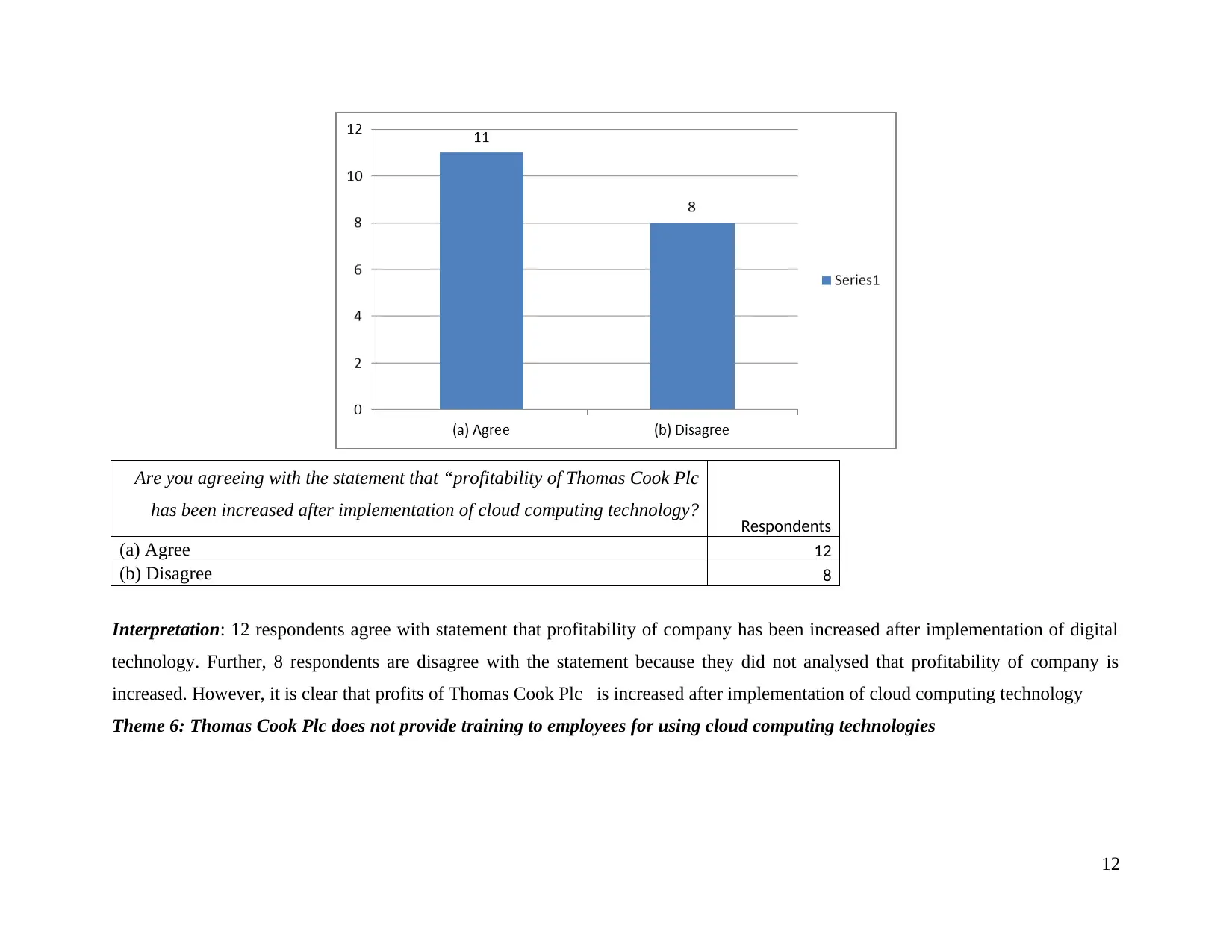
Are you agreeing with the statement that “profitability of Thomas Cook Plc
has been increased after implementation of cloud computing technology? Respondents
(a) Agree 12
(b) Disagree 8
Interpretation: 12 respondents agree with statement that profitability of company has been increased after implementation of digital
technology. Further, 8 respondents are disagree with the statement because they did not analysed that profitability of company is
increased. However, it is clear that profits of Thomas Cook Plc is increased after implementation of cloud computing technology
Theme 6: Thomas Cook Plc does not provide training to employees for using cloud computing technologies
12
has been increased after implementation of cloud computing technology? Respondents
(a) Agree 12
(b) Disagree 8
Interpretation: 12 respondents agree with statement that profitability of company has been increased after implementation of digital
technology. Further, 8 respondents are disagree with the statement because they did not analysed that profitability of company is
increased. However, it is clear that profits of Thomas Cook Plc is increased after implementation of cloud computing technology
Theme 6: Thomas Cook Plc does not provide training to employees for using cloud computing technologies
12
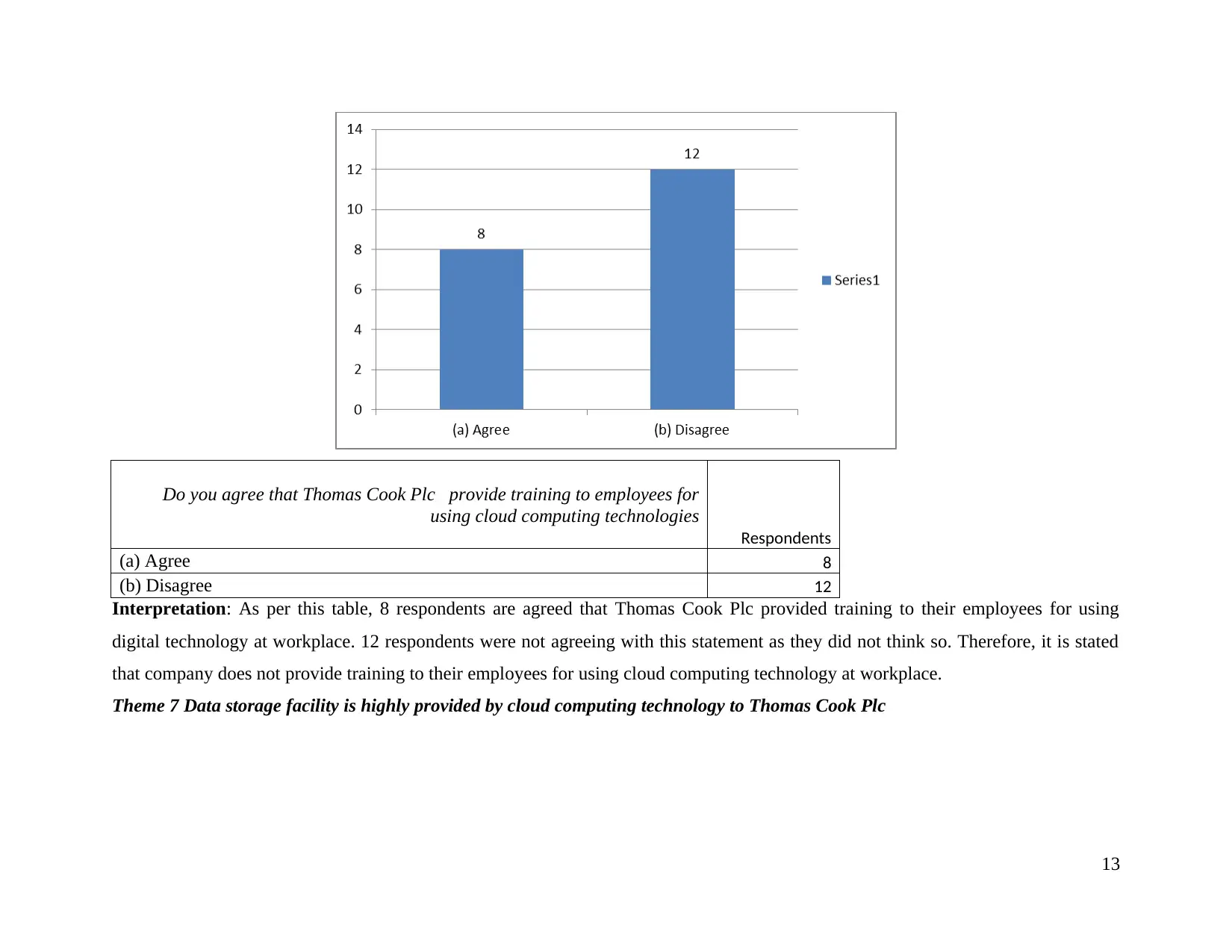
Do you agree that Thomas Cook Plc provide training to employees for
using cloud computing technologies
Respondents
(a) Agree 8
(b) Disagree 12
Interpretation: As per this table, 8 respondents are agreed that Thomas Cook Plc provided training to their employees for using
digital technology at workplace. 12 respondents were not agreeing with this statement as they did not think so. Therefore, it is stated
that company does not provide training to their employees for using cloud computing technology at workplace.
Theme 7 Data storage facility is highly provided by cloud computing technology to Thomas Cook Plc
13
using cloud computing technologies
Respondents
(a) Agree 8
(b) Disagree 12
Interpretation: As per this table, 8 respondents are agreed that Thomas Cook Plc provided training to their employees for using
digital technology at workplace. 12 respondents were not agreeing with this statement as they did not think so. Therefore, it is stated
that company does not provide training to their employees for using cloud computing technology at workplace.
Theme 7 Data storage facility is highly provided by cloud computing technology to Thomas Cook Plc
13
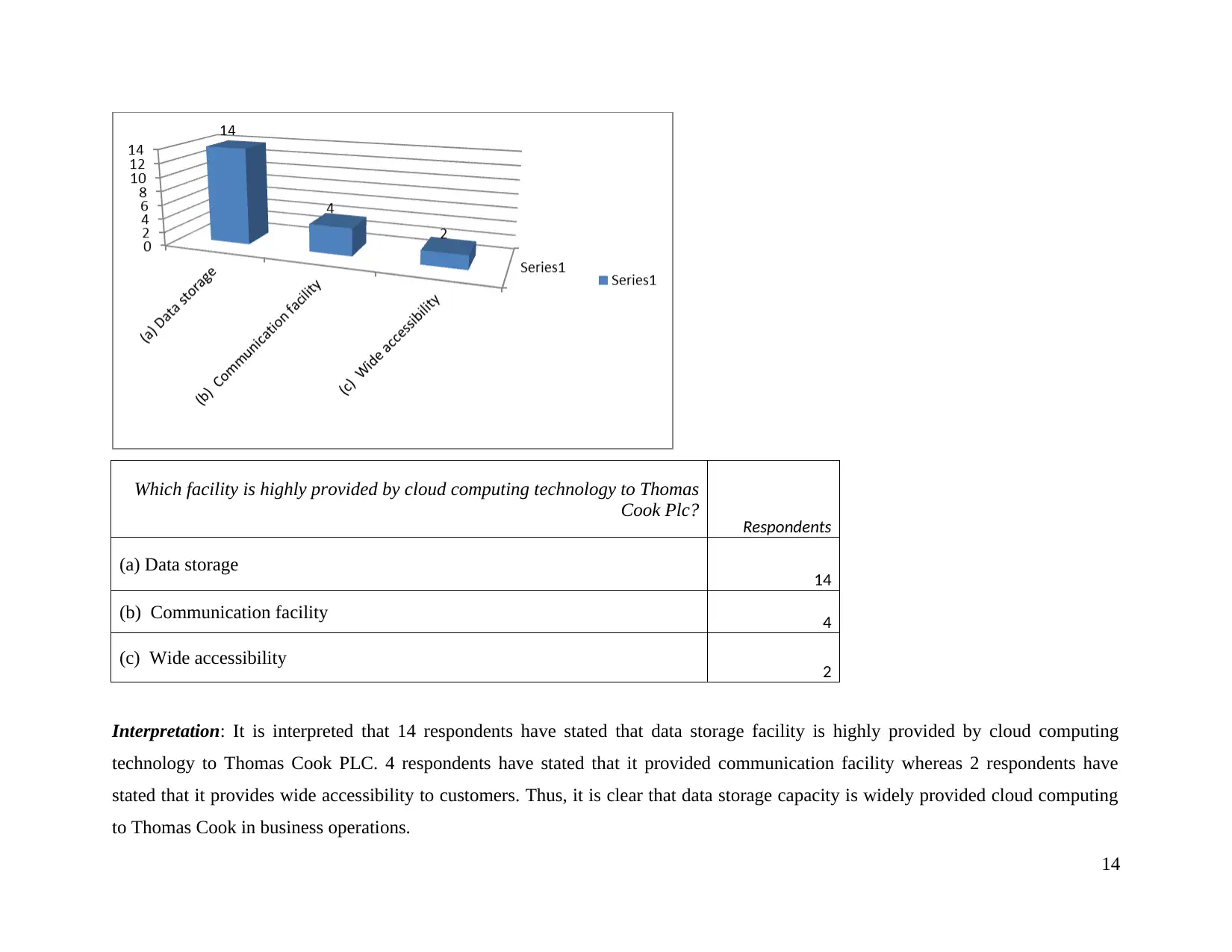
Which facility is highly provided by cloud computing technology to Thomas
Cook Plc? Respondents
(a) Data storage 14
(b) Communication facility 4
(c) Wide accessibility 2
Interpretation: It is interpreted that 14 respondents have stated that data storage facility is highly provided by cloud computing
technology to Thomas Cook PLC. 4 respondents have stated that it provided communication facility whereas 2 respondents have
stated that it provides wide accessibility to customers. Thus, it is clear that data storage capacity is widely provided cloud computing
to Thomas Cook in business operations.
14
Cook Plc? Respondents
(a) Data storage 14
(b) Communication facility 4
(c) Wide accessibility 2
Interpretation: It is interpreted that 14 respondents have stated that data storage facility is highly provided by cloud computing
technology to Thomas Cook PLC. 4 respondents have stated that it provided communication facility whereas 2 respondents have
stated that it provides wide accessibility to customers. Thus, it is clear that data storage capacity is widely provided cloud computing
to Thomas Cook in business operations.
14
Secure Best Marks with AI Grader
Need help grading? Try our AI Grader for instant feedback on your assignments.
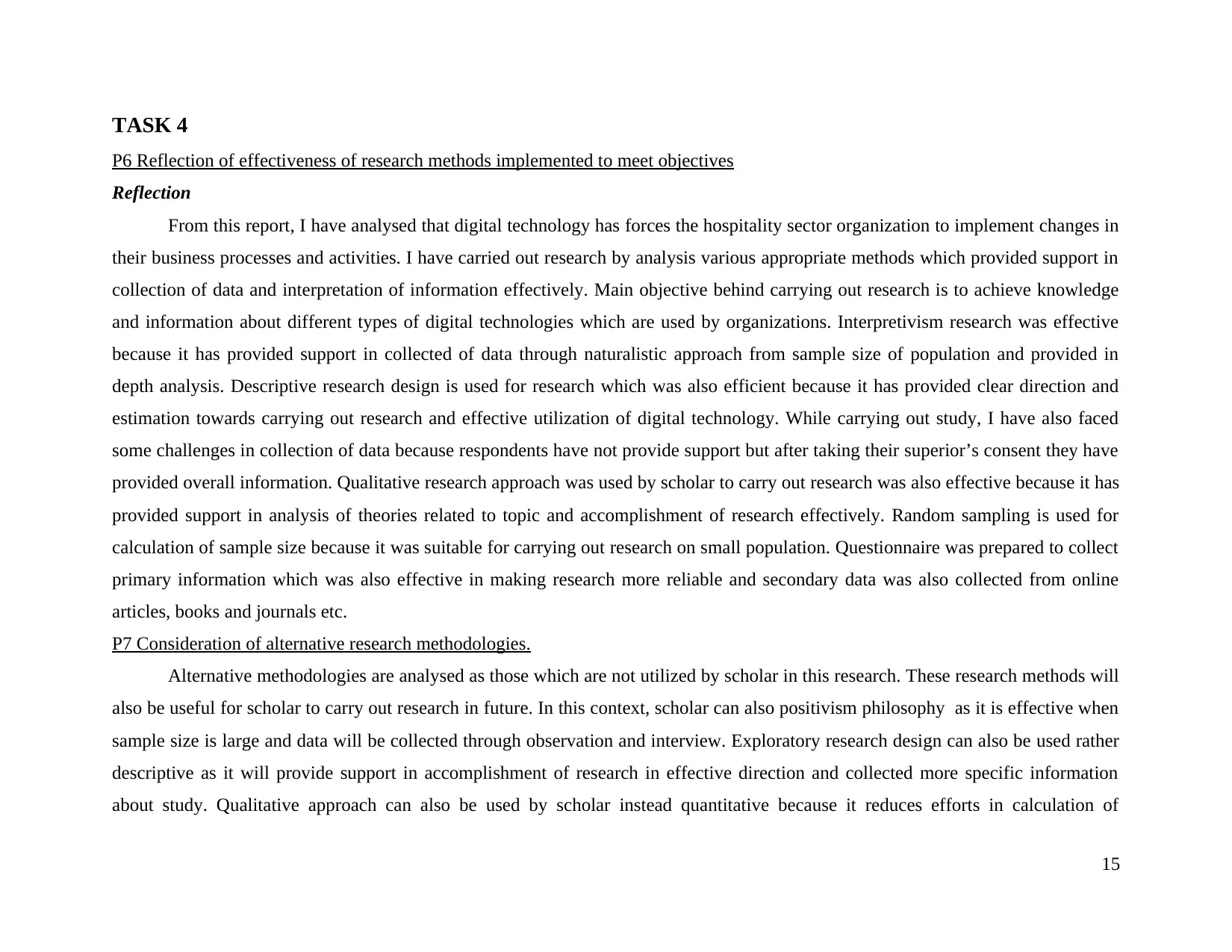
TASK 4
P6 Reflection of effectiveness of research methods implemented to meet objectives
Reflection
From this report, I have analysed that digital technology has forces the hospitality sector organization to implement changes in
their business processes and activities. I have carried out research by analysis various appropriate methods which provided support in
collection of data and interpretation of information effectively. Main objective behind carrying out research is to achieve knowledge
and information about different types of digital technologies which are used by organizations. Interpretivism research was effective
because it has provided support in collected of data through naturalistic approach from sample size of population and provided in
depth analysis. Descriptive research design is used for research which was also efficient because it has provided clear direction and
estimation towards carrying out research and effective utilization of digital technology. While carrying out study, I have also faced
some challenges in collection of data because respondents have not provide support but after taking their superior’s consent they have
provided overall information. Qualitative research approach was used by scholar to carry out research was also effective because it has
provided support in analysis of theories related to topic and accomplishment of research effectively. Random sampling is used for
calculation of sample size because it was suitable for carrying out research on small population. Questionnaire was prepared to collect
primary information which was also effective in making research more reliable and secondary data was also collected from online
articles, books and journals etc.
P7 Consideration of alternative research methodologies.
Alternative methodologies are analysed as those which are not utilized by scholar in this research. These research methods will
also be useful for scholar to carry out research in future. In this context, scholar can also positivism philosophy as it is effective when
sample size is large and data will be collected through observation and interview. Exploratory research design can also be used rather
descriptive as it will provide support in accomplishment of research in effective direction and collected more specific information
about study. Qualitative approach can also be used by scholar instead quantitative because it reduces efforts in calculation of
15
P6 Reflection of effectiveness of research methods implemented to meet objectives
Reflection
From this report, I have analysed that digital technology has forces the hospitality sector organization to implement changes in
their business processes and activities. I have carried out research by analysis various appropriate methods which provided support in
collection of data and interpretation of information effectively. Main objective behind carrying out research is to achieve knowledge
and information about different types of digital technologies which are used by organizations. Interpretivism research was effective
because it has provided support in collected of data through naturalistic approach from sample size of population and provided in
depth analysis. Descriptive research design is used for research which was also efficient because it has provided clear direction and
estimation towards carrying out research and effective utilization of digital technology. While carrying out study, I have also faced
some challenges in collection of data because respondents have not provide support but after taking their superior’s consent they have
provided overall information. Qualitative research approach was used by scholar to carry out research was also effective because it has
provided support in analysis of theories related to topic and accomplishment of research effectively. Random sampling is used for
calculation of sample size because it was suitable for carrying out research on small population. Questionnaire was prepared to collect
primary information which was also effective in making research more reliable and secondary data was also collected from online
articles, books and journals etc.
P7 Consideration of alternative research methodologies.
Alternative methodologies are analysed as those which are not utilized by scholar in this research. These research methods will
also be useful for scholar to carry out research in future. In this context, scholar can also positivism philosophy as it is effective when
sample size is large and data will be collected through observation and interview. Exploratory research design can also be used rather
descriptive as it will provide support in accomplishment of research in effective direction and collected more specific information
about study. Qualitative approach can also be used by scholar instead quantitative because it reduces efforts in calculation of
15
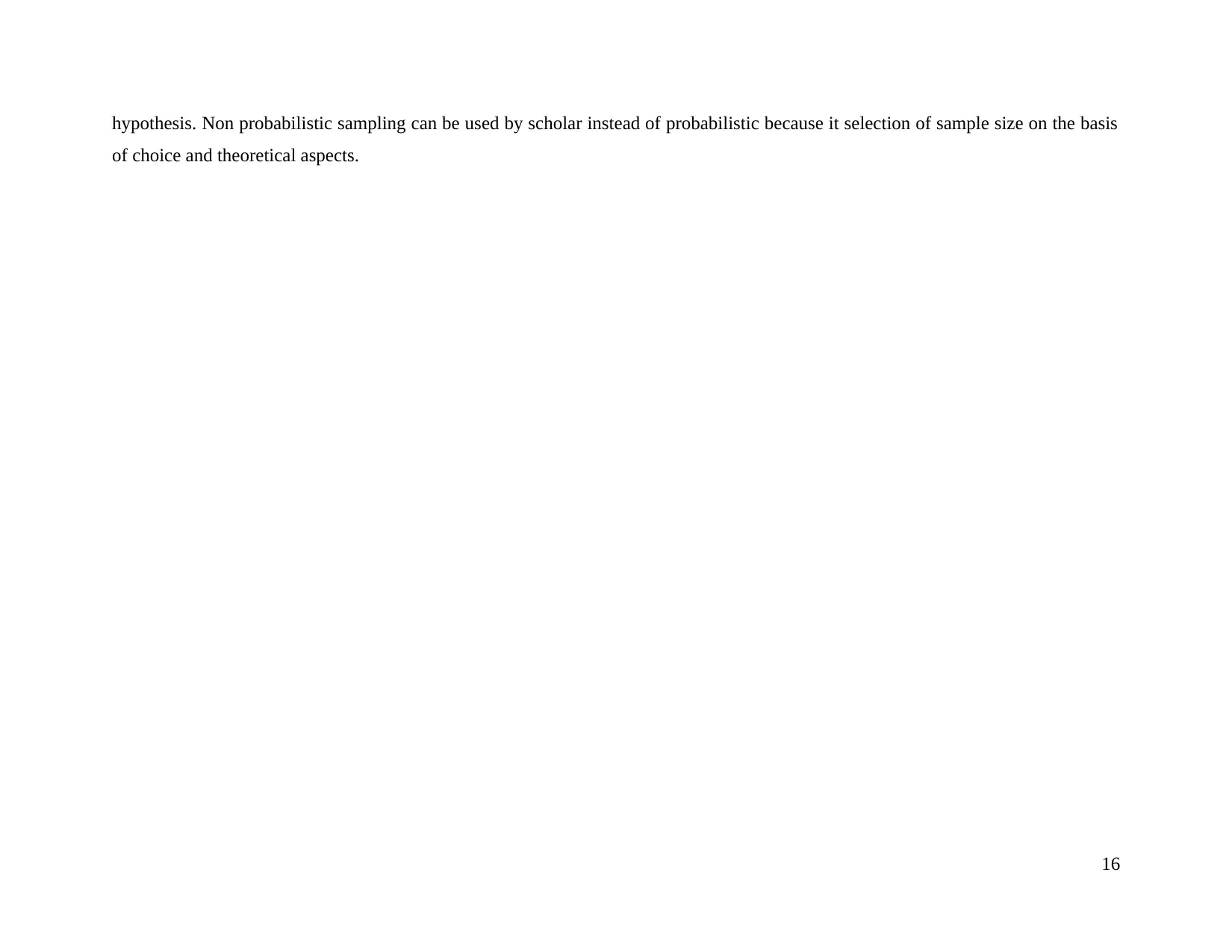
hypothesis. Non probabilistic sampling can be used by scholar instead of probabilistic because it selection of sample size on the basis
of choice and theoretical aspects.
16
of choice and theoretical aspects.
16
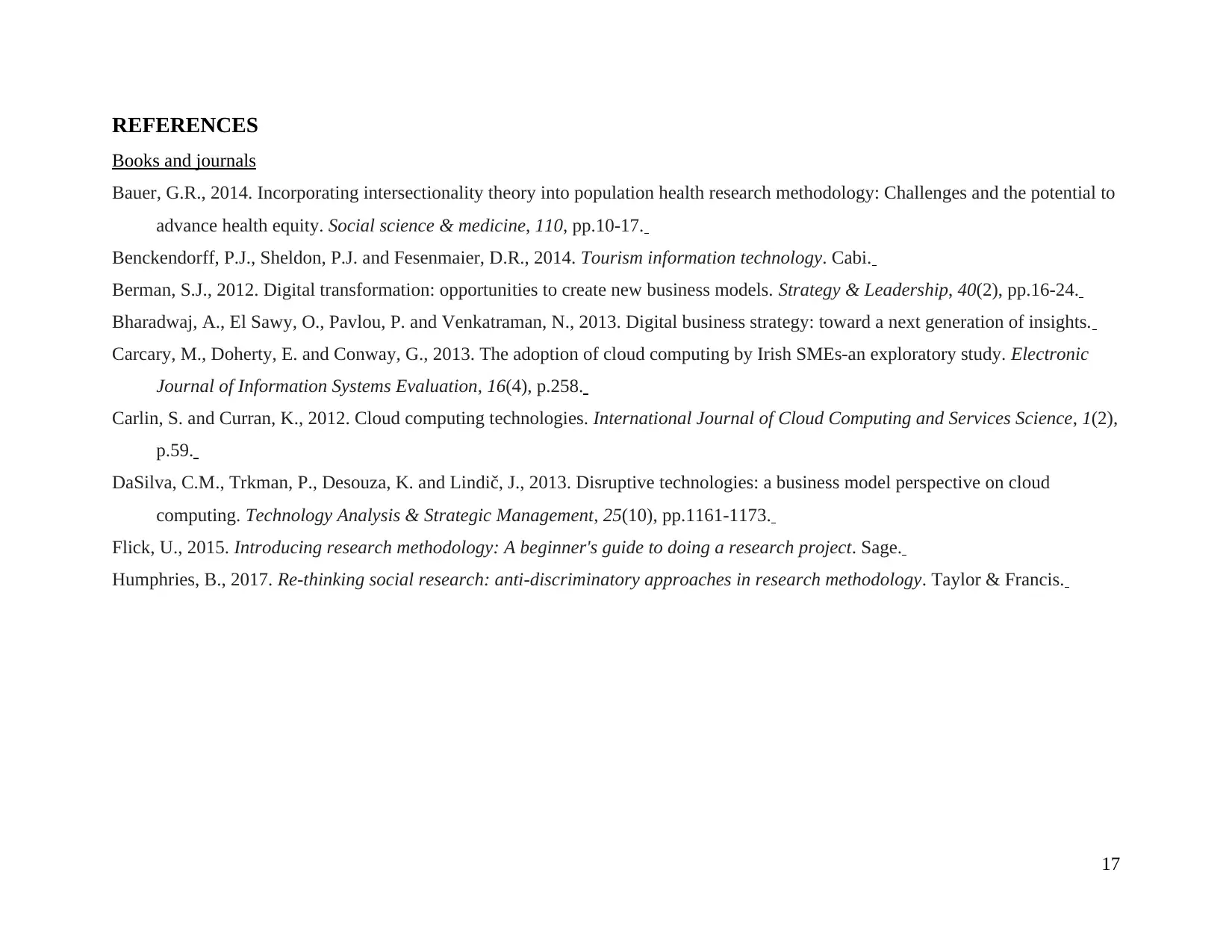
REFERENCES
Books and journals
Bauer, G.R., 2014. Incorporating intersectionality theory into population health research methodology: Challenges and the potential to
advance health equity. Social science & medicine, 110, pp.10-17.
Benckendorff, P.J., Sheldon, P.J. and Fesenmaier, D.R., 2014. Tourism information technology. Cabi.
Berman, S.J., 2012. Digital transformation: opportunities to create new business models. Strategy & Leadership, 40(2), pp.16-24.
Bharadwaj, A., El Sawy, O., Pavlou, P. and Venkatraman, N., 2013. Digital business strategy: toward a next generation of insights.
Carcary, M., Doherty, E. and Conway, G., 2013. The adoption of cloud computing by Irish SMEs-an exploratory study. Electronic
Journal of Information Systems Evaluation, 16(4), p.258.
Carlin, S. and Curran, K., 2012. Cloud computing technologies. International Journal of Cloud Computing and Services Science, 1(2),
p.59.
DaSilva, C.M., Trkman, P., Desouza, K. and Lindič, J., 2013. Disruptive technologies: a business model perspective on cloud
computing. Technology Analysis & Strategic Management, 25(10), pp.1161-1173.
Flick, U., 2015. Introducing research methodology: A beginner's guide to doing a research project. Sage.
Humphries, B., 2017. Re-thinking social research: anti-discriminatory approaches in research methodology. Taylor & Francis.
17
Books and journals
Bauer, G.R., 2014. Incorporating intersectionality theory into population health research methodology: Challenges and the potential to
advance health equity. Social science & medicine, 110, pp.10-17.
Benckendorff, P.J., Sheldon, P.J. and Fesenmaier, D.R., 2014. Tourism information technology. Cabi.
Berman, S.J., 2012. Digital transformation: opportunities to create new business models. Strategy & Leadership, 40(2), pp.16-24.
Bharadwaj, A., El Sawy, O., Pavlou, P. and Venkatraman, N., 2013. Digital business strategy: toward a next generation of insights.
Carcary, M., Doherty, E. and Conway, G., 2013. The adoption of cloud computing by Irish SMEs-an exploratory study. Electronic
Journal of Information Systems Evaluation, 16(4), p.258.
Carlin, S. and Curran, K., 2012. Cloud computing technologies. International Journal of Cloud Computing and Services Science, 1(2),
p.59.
DaSilva, C.M., Trkman, P., Desouza, K. and Lindič, J., 2013. Disruptive technologies: a business model perspective on cloud
computing. Technology Analysis & Strategic Management, 25(10), pp.1161-1173.
Flick, U., 2015. Introducing research methodology: A beginner's guide to doing a research project. Sage.
Humphries, B., 2017. Re-thinking social research: anti-discriminatory approaches in research methodology. Taylor & Francis.
17
Paraphrase This Document
Need a fresh take? Get an instant paraphrase of this document with our AI Paraphraser
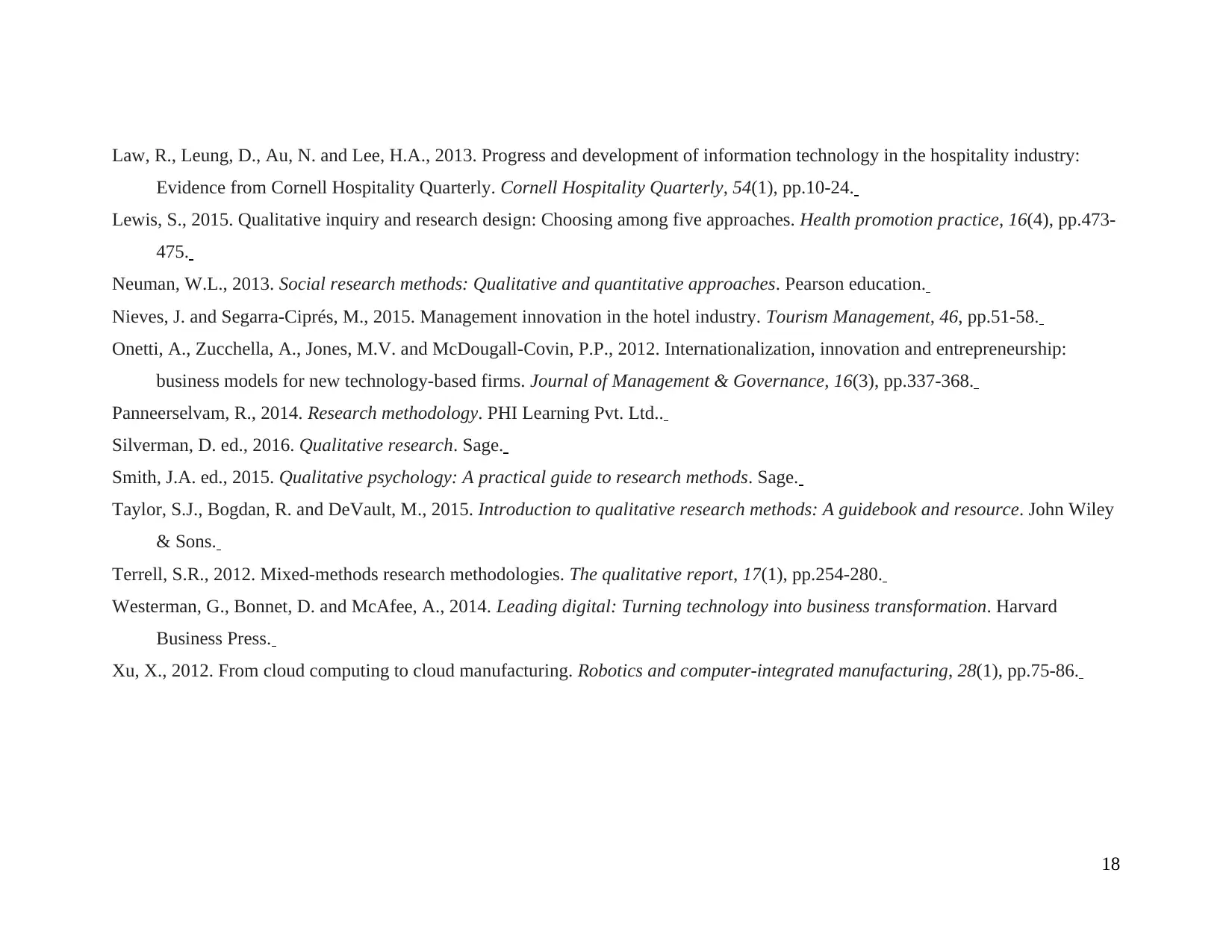
Law, R., Leung, D., Au, N. and Lee, H.A., 2013. Progress and development of information technology in the hospitality industry:
Evidence from Cornell Hospitality Quarterly. Cornell Hospitality Quarterly, 54(1), pp.10-24.
Lewis, S., 2015. Qualitative inquiry and research design: Choosing among five approaches. Health promotion practice, 16(4), pp.473-
475.
Neuman, W.L., 2013. Social research methods: Qualitative and quantitative approaches. Pearson education.
Nieves, J. and Segarra-Ciprés, M., 2015. Management innovation in the hotel industry. Tourism Management, 46, pp.51-58.
Onetti, A., Zucchella, A., Jones, M.V. and McDougall-Covin, P.P., 2012. Internationalization, innovation and entrepreneurship:
business models for new technology-based firms. Journal of Management & Governance, 16(3), pp.337-368.
Panneerselvam, R., 2014. Research methodology. PHI Learning Pvt. Ltd..
Silverman, D. ed., 2016. Qualitative research. Sage.
Smith, J.A. ed., 2015. Qualitative psychology: A practical guide to research methods. Sage.
Taylor, S.J., Bogdan, R. and DeVault, M., 2015. Introduction to qualitative research methods: A guidebook and resource. John Wiley
& Sons.
Terrell, S.R., 2012. Mixed-methods research methodologies. The qualitative report, 17(1), pp.254-280.
Westerman, G., Bonnet, D. and McAfee, A., 2014. Leading digital: Turning technology into business transformation. Harvard
Business Press.
Xu, X., 2012. From cloud computing to cloud manufacturing. Robotics and computer-integrated manufacturing, 28(1), pp.75-86.
18
Evidence from Cornell Hospitality Quarterly. Cornell Hospitality Quarterly, 54(1), pp.10-24.
Lewis, S., 2015. Qualitative inquiry and research design: Choosing among five approaches. Health promotion practice, 16(4), pp.473-
475.
Neuman, W.L., 2013. Social research methods: Qualitative and quantitative approaches. Pearson education.
Nieves, J. and Segarra-Ciprés, M., 2015. Management innovation in the hotel industry. Tourism Management, 46, pp.51-58.
Onetti, A., Zucchella, A., Jones, M.V. and McDougall-Covin, P.P., 2012. Internationalization, innovation and entrepreneurship:
business models for new technology-based firms. Journal of Management & Governance, 16(3), pp.337-368.
Panneerselvam, R., 2014. Research methodology. PHI Learning Pvt. Ltd..
Silverman, D. ed., 2016. Qualitative research. Sage.
Smith, J.A. ed., 2015. Qualitative psychology: A practical guide to research methods. Sage.
Taylor, S.J., Bogdan, R. and DeVault, M., 2015. Introduction to qualitative research methods: A guidebook and resource. John Wiley
& Sons.
Terrell, S.R., 2012. Mixed-methods research methodologies. The qualitative report, 17(1), pp.254-280.
Westerman, G., Bonnet, D. and McAfee, A., 2014. Leading digital: Turning technology into business transformation. Harvard
Business Press.
Xu, X., 2012. From cloud computing to cloud manufacturing. Robotics and computer-integrated manufacturing, 28(1), pp.75-86.
18
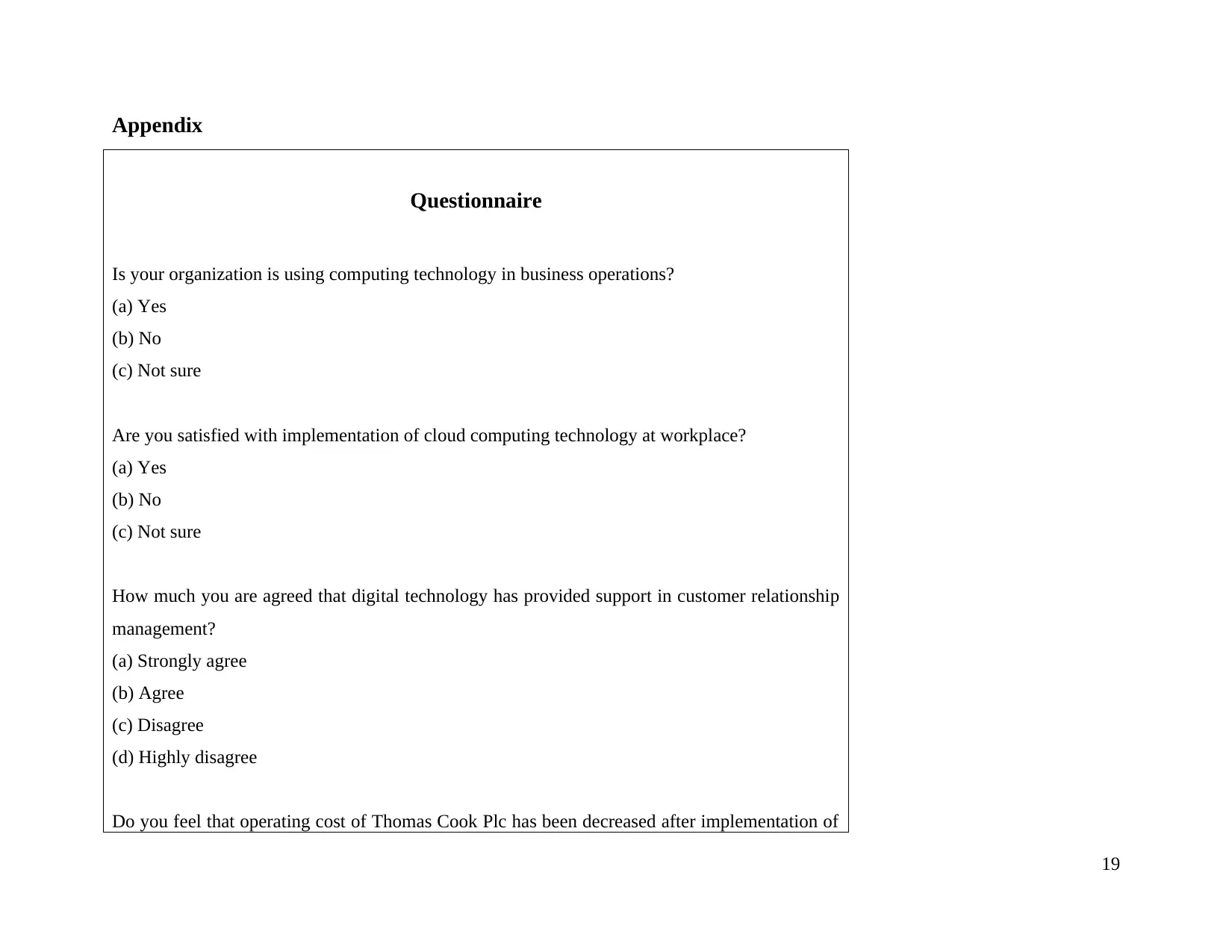
Appendix
Questionnaire
Is your organization is using computing technology in business operations?
(a) Yes
(b) No
(c) Not sure
Are you satisfied with implementation of cloud computing technology at workplace?
(a) Yes
(b) No
(c) Not sure
How much you are agreed that digital technology has provided support in customer relationship
management?
(a) Strongly agree
(b) Agree
(c) Disagree
(d) Highly disagree
Do you feel that operating cost of Thomas Cook Plc has been decreased after implementation of
19
Questionnaire
Is your organization is using computing technology in business operations?
(a) Yes
(b) No
(c) Not sure
Are you satisfied with implementation of cloud computing technology at workplace?
(a) Yes
(b) No
(c) Not sure
How much you are agreed that digital technology has provided support in customer relationship
management?
(a) Strongly agree
(b) Agree
(c) Disagree
(d) Highly disagree
Do you feel that operating cost of Thomas Cook Plc has been decreased after implementation of
19
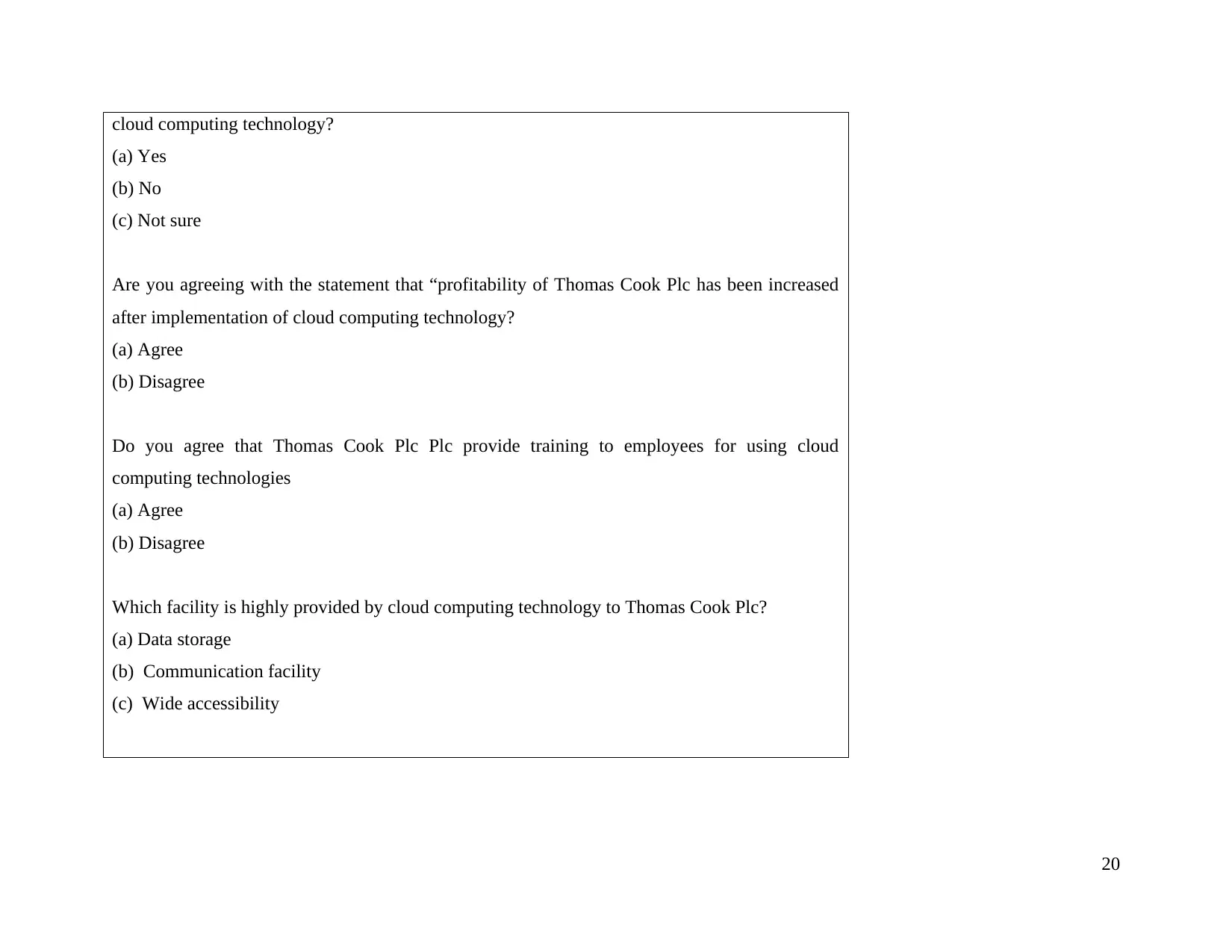
cloud computing technology?
(a) Yes
(b) No
(c) Not sure
Are you agreeing with the statement that “profitability of Thomas Cook Plc has been increased
after implementation of cloud computing technology?
(a) Agree
(b) Disagree
Do you agree that Thomas Cook Plc Plc provide training to employees for using cloud
computing technologies
(a) Agree
(b) Disagree
Which facility is highly provided by cloud computing technology to Thomas Cook Plc?
(a) Data storage
(b) Communication facility
(c) Wide accessibility
20
(a) Yes
(b) No
(c) Not sure
Are you agreeing with the statement that “profitability of Thomas Cook Plc has been increased
after implementation of cloud computing technology?
(a) Agree
(b) Disagree
Do you agree that Thomas Cook Plc Plc provide training to employees for using cloud
computing technologies
(a) Agree
(b) Disagree
Which facility is highly provided by cloud computing technology to Thomas Cook Plc?
(a) Data storage
(b) Communication facility
(c) Wide accessibility
20
Secure Best Marks with AI Grader
Need help grading? Try our AI Grader for instant feedback on your assignments.
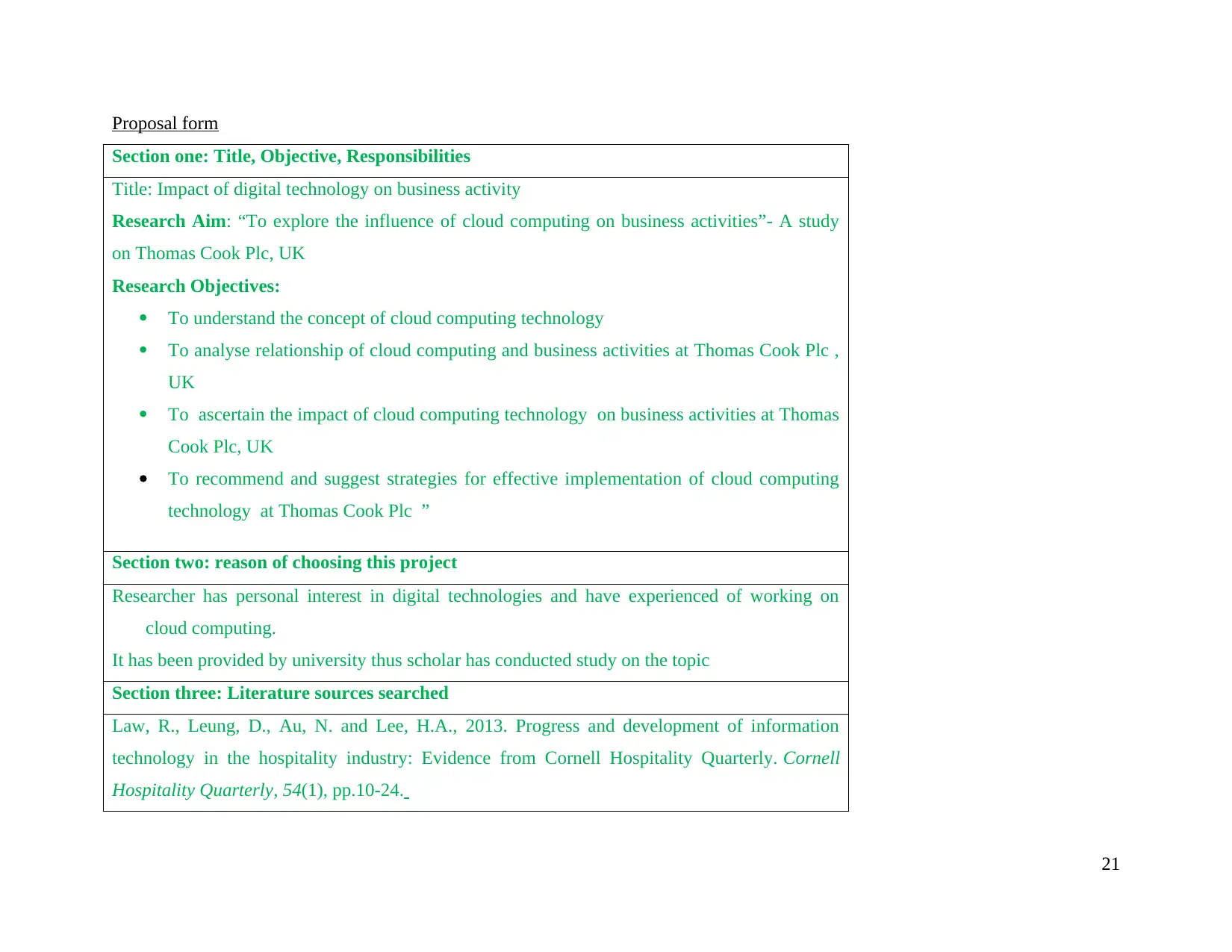
Proposal form
Section one: Title, Objective, Responsibilities
Title: Impact of digital technology on business activity
Research Aim: “To explore the influence of cloud computing on business activities”- A study
on Thomas Cook Plc, UK
Research Objectives:
To understand the concept of cloud computing technology
To analyse relationship of cloud computing and business activities at Thomas Cook Plc ,
UK
To ascertain the impact of cloud computing technology on business activities at Thomas
Cook Plc, UK
To recommend and suggest strategies for effective implementation of cloud computing
technology at Thomas Cook Plc ”
Section two: reason of choosing this project
Researcher has personal interest in digital technologies and have experienced of working on
cloud computing.
It has been provided by university thus scholar has conducted study on the topic
Section three: Literature sources searched
Law, R., Leung, D., Au, N. and Lee, H.A., 2013. Progress and development of information
technology in the hospitality industry: Evidence from Cornell Hospitality Quarterly. Cornell
Hospitality Quarterly, 54(1), pp.10-24.
21
Section one: Title, Objective, Responsibilities
Title: Impact of digital technology on business activity
Research Aim: “To explore the influence of cloud computing on business activities”- A study
on Thomas Cook Plc, UK
Research Objectives:
To understand the concept of cloud computing technology
To analyse relationship of cloud computing and business activities at Thomas Cook Plc ,
UK
To ascertain the impact of cloud computing technology on business activities at Thomas
Cook Plc, UK
To recommend and suggest strategies for effective implementation of cloud computing
technology at Thomas Cook Plc ”
Section two: reason of choosing this project
Researcher has personal interest in digital technologies and have experienced of working on
cloud computing.
It has been provided by university thus scholar has conducted study on the topic
Section three: Literature sources searched
Law, R., Leung, D., Au, N. and Lee, H.A., 2013. Progress and development of information
technology in the hospitality industry: Evidence from Cornell Hospitality Quarterly. Cornell
Hospitality Quarterly, 54(1), pp.10-24.
21
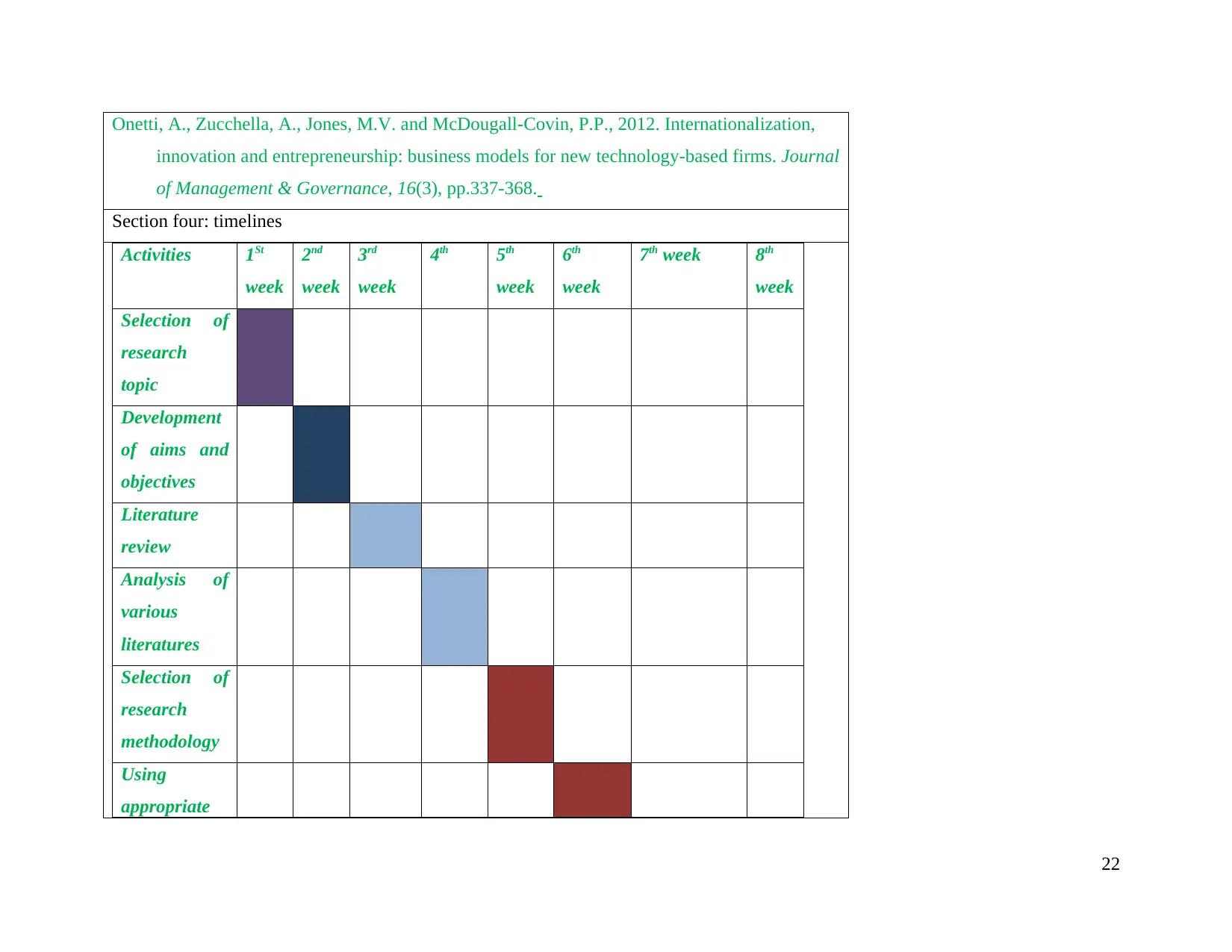
Onetti, A., Zucchella, A., Jones, M.V. and McDougall-Covin, P.P., 2012. Internationalization,
innovation and entrepreneurship: business models for new technology-based firms. Journal
of Management & Governance, 16(3), pp.337-368.
Section four: timelines
Activities 1St
week
2nd
week
3rd
week
4th 5th
week
6th
week
7th week 8th
week
Selection of
research
topic
Development
of aims and
objectives
Literature
review
Analysis of
various
literatures
Selection of
research
methodology
Using
appropriate
22
innovation and entrepreneurship: business models for new technology-based firms. Journal
of Management & Governance, 16(3), pp.337-368.
Section four: timelines
Activities 1St
week
2nd
week
3rd
week
4th 5th
week
6th
week
7th week 8th
week
Selection of
research
topic
Development
of aims and
objectives
Literature
review
Analysis of
various
literatures
Selection of
research
methodology
Using
appropriate
22
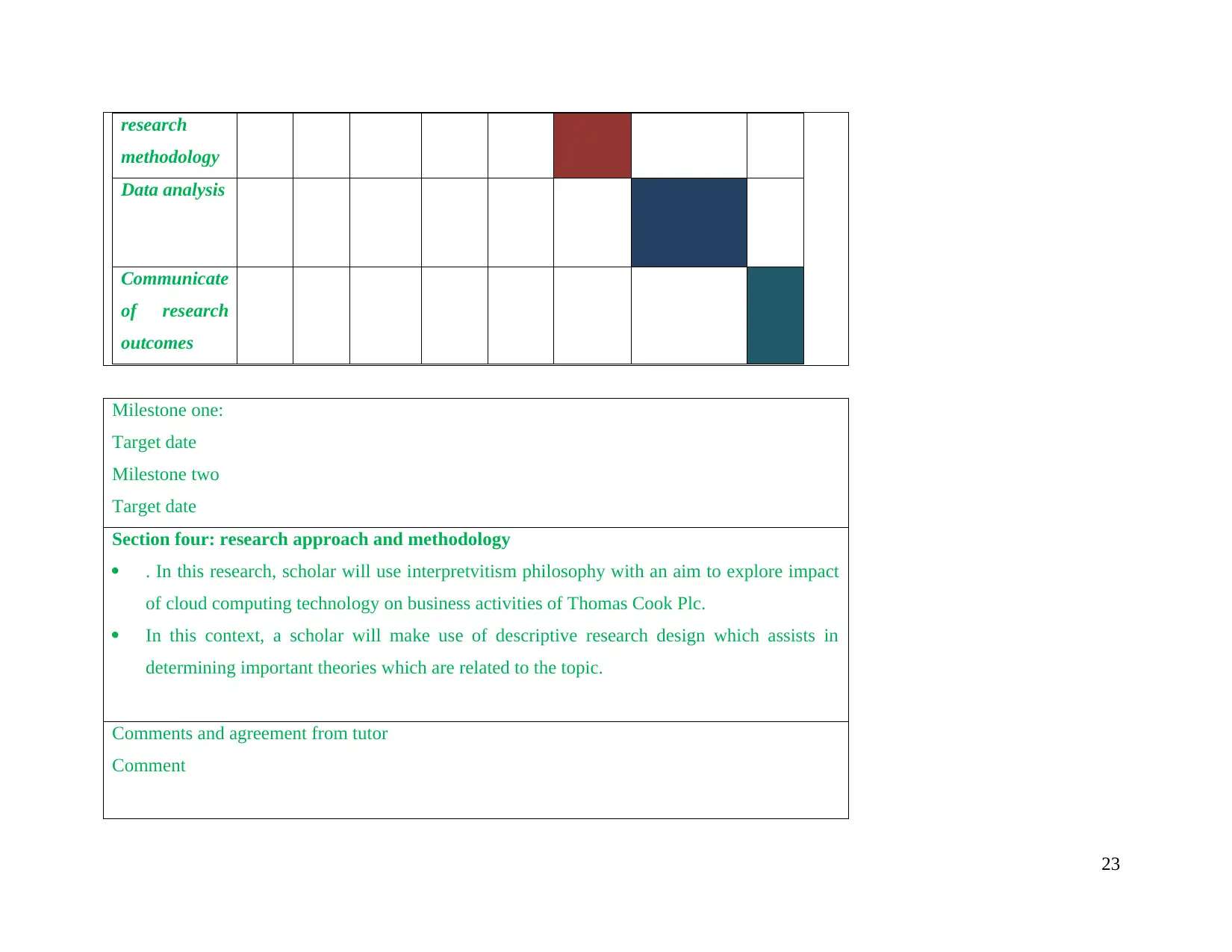
research
methodology
Data analysis
Communicate
of research
outcomes
Milestone one:
Target date
Milestone two
Target date
Section four: research approach and methodology
. In this research, scholar will use interpretvitism philosophy with an aim to explore impact
of cloud computing technology on business activities of Thomas Cook Plc.
In this context, a scholar will make use of descriptive research design which assists in
determining important theories which are related to the topic.
Comments and agreement from tutor
Comment
23
methodology
Data analysis
Communicate
of research
outcomes
Milestone one:
Target date
Milestone two
Target date
Section four: research approach and methodology
. In this research, scholar will use interpretvitism philosophy with an aim to explore impact
of cloud computing technology on business activities of Thomas Cook Plc.
In this context, a scholar will make use of descriptive research design which assists in
determining important theories which are related to the topic.
Comments and agreement from tutor
Comment
23
Paraphrase This Document
Need a fresh take? Get an instant paraphrase of this document with our AI Paraphraser
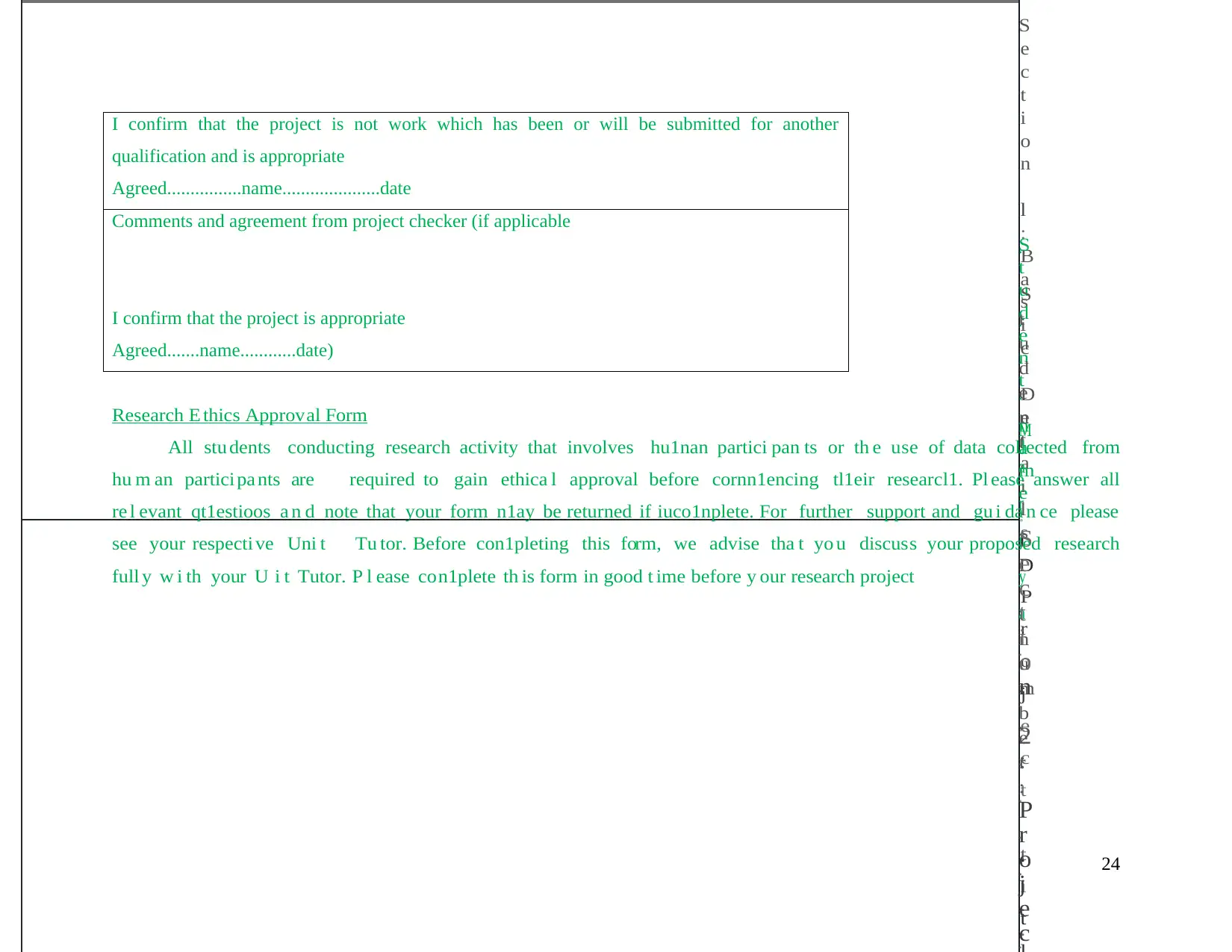
S
e
c
t
i
o
n
l
:
B
a
s
i
c
D
e
t
a
i
l
s
P
r
o
j
e
c
t
t
i
t
S
t
u
d
e
n
t
n
a
m
e
:
.
.
.
.
.
M
a
r
i
y
a
.
.
.
.
.
.
.
.
.
S
t
u
d
e
n
t
.
I
D
n
u
m
b
e
r
:
·
·
·
·
S
e
c
t
i
o
n
2
:
P
r
o
j
e
c
I confirm that the project is not work which has been or will be submitted for another
qualification and is appropriate
Agreed................name.....................date
Comments and agreement from project checker (if applicable
I confirm that the project is appropriate
Agreed.......name............date)
Research E thics Approval Form
All stu dents conducting research activity that involves hu1nan partici pan ts or th e use of data collected from
hu m an partici pa nts are required to gain ethica l approval before cornn1encing tl1eir researcl1. Pl ease answer all
re l evant qt1estioos a n d note that your form n1ay be returned if iuco1nplete. For further support and gu i da n ce please
see your respecti ve Uni t Tu tor. Before con1pleting this form, we advise tha t yo u discuss your proposed research
full y w i th your U i t Tutor. P l ease con1plete th is form in good t ime before y our research project
24
e
c
t
i
o
n
l
:
B
a
s
i
c
D
e
t
a
i
l
s
P
r
o
j
e
c
t
t
i
t
S
t
u
d
e
n
t
n
a
m
e
:
.
.
.
.
.
M
a
r
i
y
a
.
.
.
.
.
.
.
.
.
S
t
u
d
e
n
t
.
I
D
n
u
m
b
e
r
:
·
·
·
·
S
e
c
t
i
o
n
2
:
P
r
o
j
e
c
I confirm that the project is not work which has been or will be submitted for another
qualification and is appropriate
Agreed................name.....................date
Comments and agreement from project checker (if applicable
I confirm that the project is appropriate
Agreed.......name............date)
Research E thics Approval Form
All stu dents conducting research activity that involves hu1nan partici pan ts or th e use of data collected from
hu m an partici pa nts are required to gain ethica l approval before cornn1encing tl1eir researcl1. Pl ease answer all
re l evant qt1estioos a n d note that your form n1ay be returned if iuco1nplete. For further support and gu i da n ce please
see your respecti ve Uni t Tu tor. Before con1pleting this form, we advise tha t yo u discuss your proposed research
full y w i th your U i t Tutor. P l ease con1plete th is form in good t ime before y our research project
24
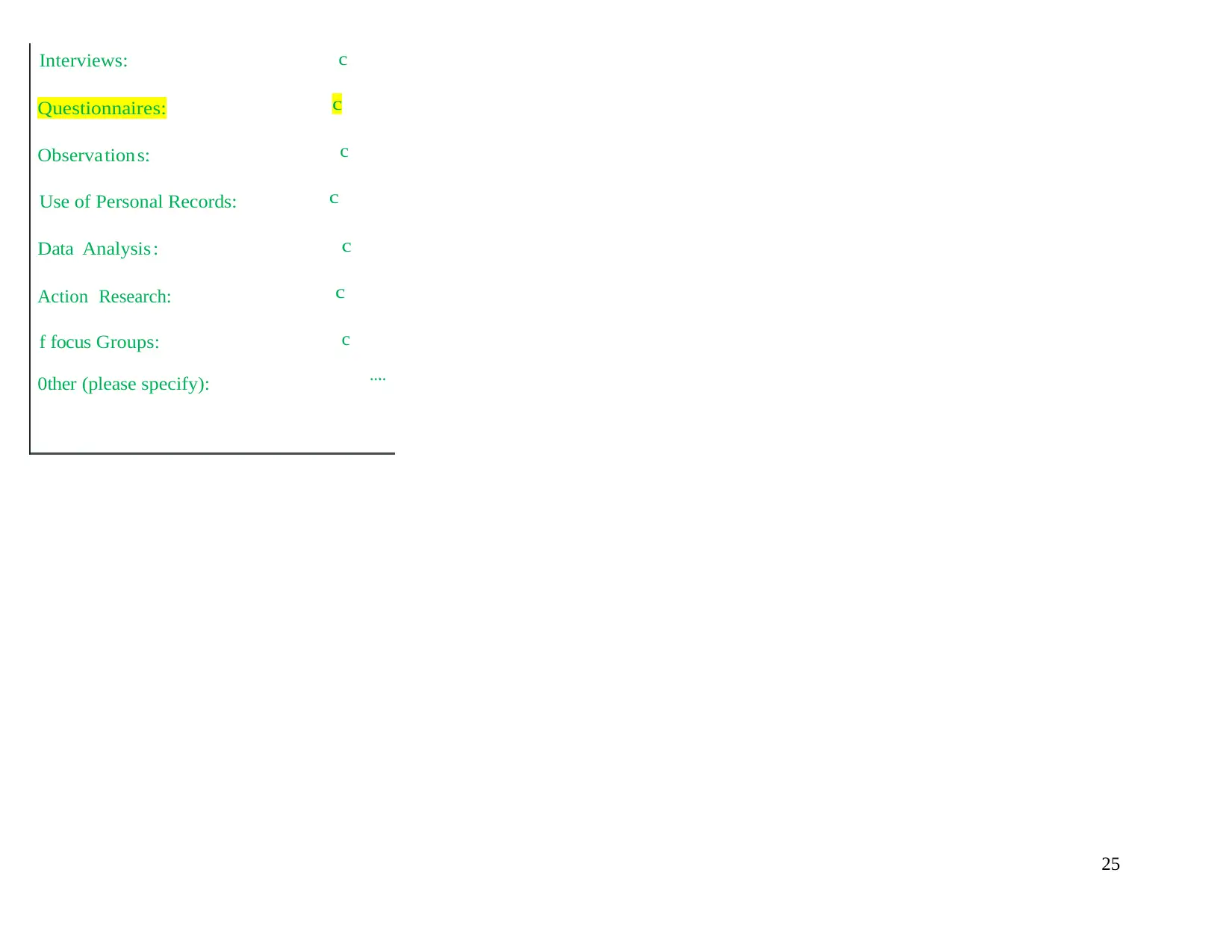
25
Interviews: c
Questionnaires: c
Observations: c
Use of Personal Records: c
Data Analysis : c
Action Research: c
f focus Groups:
0ther (please specify):
c
.....
Interviews: c
Questionnaires: c
Observations: c
Use of Personal Records: c
Data Analysis : c
Action Research: c
f focus Groups:
0ther (please specify):
c
.....

26
Secure Best Marks with AI Grader
Need help grading? Try our AI Grader for instant feedback on your assignments.
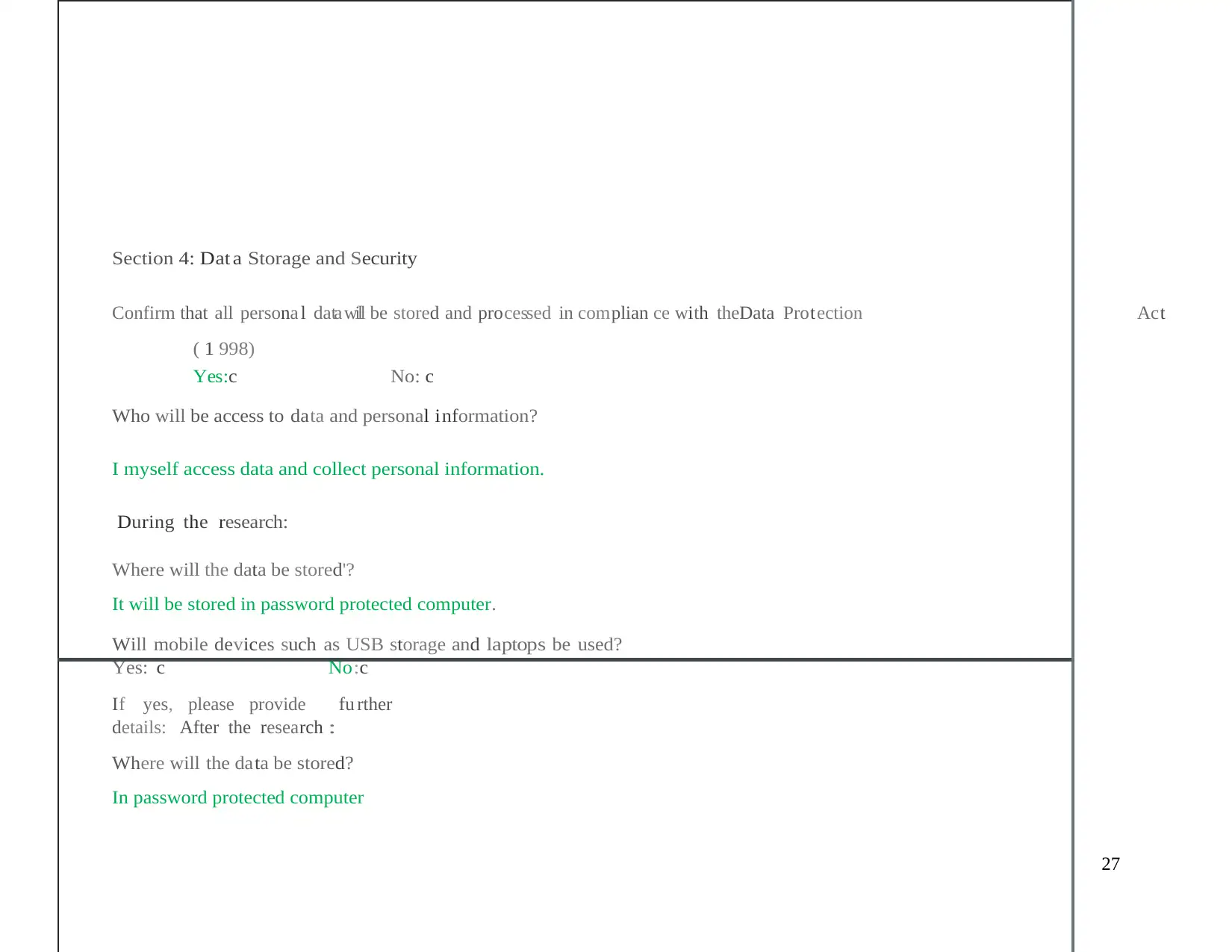
Section 4: Dat a Storage and Security
Confirm that all persona l datawill be stored and processed in complian ce with theData Protection Act
( 1 998)
Yes:c No: c
Who will be access to data and personal information?
I myself access data and collect personal information.
During the research:
Where will the data be stored'?
It will be stored in password protected computer.
Will mobile devices such as USB storage and laptops be used?
Yes: c No:c
If yes, please provide fu rther
details: After the research :
Where will the data be stored?
In password protected computer
27
Confirm that all persona l datawill be stored and processed in complian ce with theData Protection Act
( 1 998)
Yes:c No: c
Who will be access to data and personal information?
I myself access data and collect personal information.
During the research:
Where will the data be stored'?
It will be stored in password protected computer.
Will mobile devices such as USB storage and laptops be used?
Yes: c No:c
If yes, please provide fu rther
details: After the research :
Where will the data be stored?
In password protected computer
27
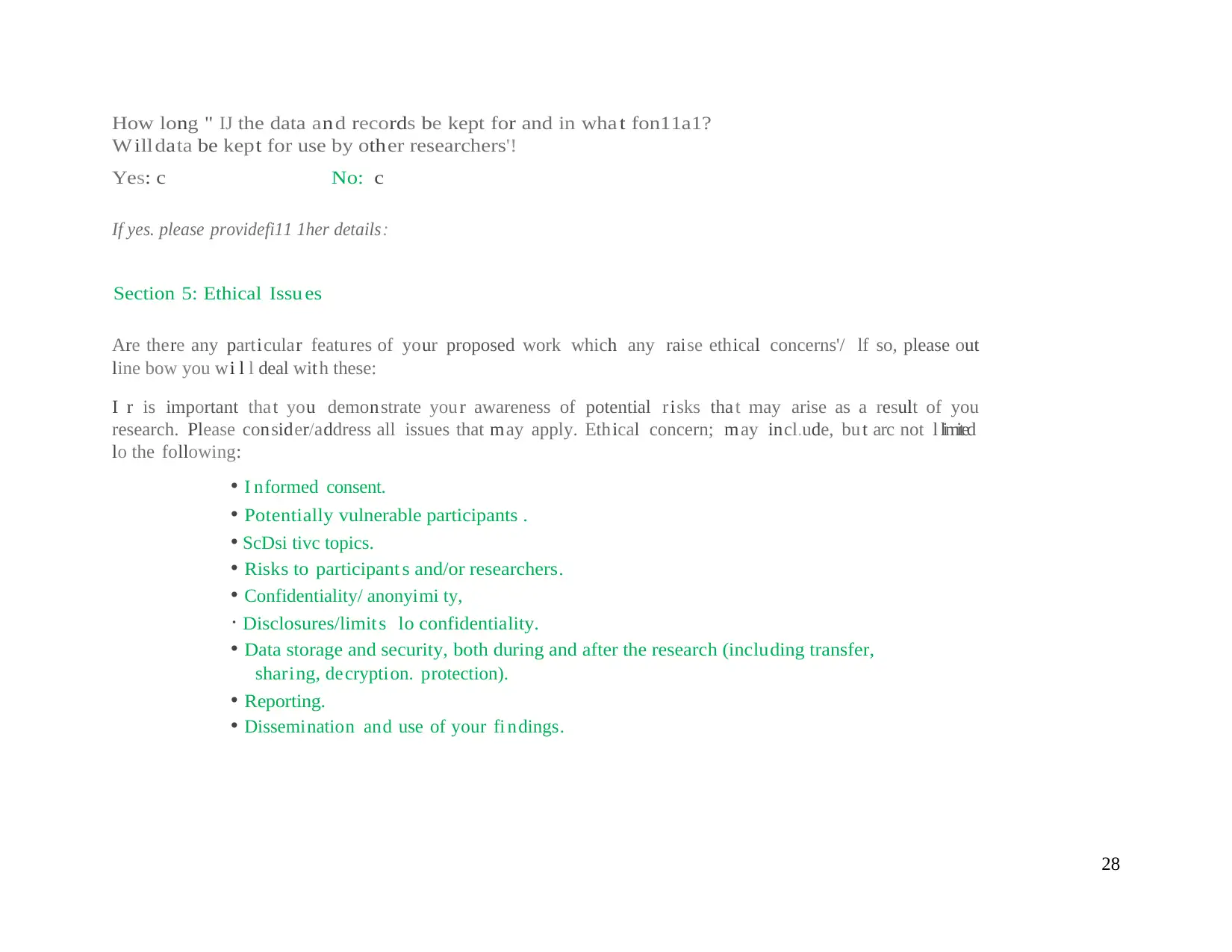
How long " IJ the data and records be kept for and in wha t fon11a1?
Will data be kept for use by other researchers'!
Yes: c No: c
If yes. please providefi11 1her details:
Section 5: Ethical Issu es
Are there any particular features of your proposed work which any raise ethical concerns'/ lf so, please out
line bow you wi l l deal wit h these:
I r is important that you demonstrate you r awareness of potential risks tha t may arise as a result of you
research. Please consider/address all issues that may apply. Ethical concern; m ay incl.ude, bu t arc not l limited
lo the following:
• I nformed consent.
• Potentially vulnerable participants .
• ScDsi tivc topics.
• Risks to participant s and/or researchers.
• Confidentiality/ anonyimi ty,
· Disclosures/limit s lo confidentiality.
• Data storage and security, both during and after the research (including transfer,
sharing, decryption. protection).
• Reporting.
• Dissemination and use of your fi ndings.
28
Will data be kept for use by other researchers'!
Yes: c No: c
If yes. please providefi11 1her details:
Section 5: Ethical Issu es
Are there any particular features of your proposed work which any raise ethical concerns'/ lf so, please out
line bow you wi l l deal wit h these:
I r is important that you demonstrate you r awareness of potential risks tha t may arise as a result of you
research. Please consider/address all issues that may apply. Ethical concern; m ay incl.ude, bu t arc not l limited
lo the following:
• I nformed consent.
• Potentially vulnerable participants .
• ScDsi tivc topics.
• Risks to participant s and/or researchers.
• Confidentiality/ anonyimi ty,
· Disclosures/limit s lo confidentiality.
• Data storage and security, both during and after the research (including transfer,
sharing, decryption. protection).
• Reporting.
• Dissemination and use of your fi ndings.
28

29
1 out of 31
Related Documents
Your All-in-One AI-Powered Toolkit for Academic Success.
+13062052269
info@desklib.com
Available 24*7 on WhatsApp / Email
![[object Object]](/_next/static/media/star-bottom.7253800d.svg)
Unlock your academic potential
© 2024 | Zucol Services PVT LTD | All rights reserved.





